- Home
- Ann M. Martin
Baby-Sitters Club 028
Baby-Sitters Club 028 Read online
Baby-Sitters Club 028
Ann M. Martin
Welcome Back, Stacey!
- by Martin, Ann M.
Chapter 1.
"Stacey? Do you think that if dinosaurs were still alive, a stegosaurus could beat a brontosaurus in a fight?" "What?" I replied. I hadn't quite heard Henry's question. I felt bad. A baby-sitter should always pay attention to her charges.
"Could a stegosaurus beat a brontosaurus in a fight? If they were alive today?" Henry waited patiently for my answer. He and his little sister Grace were making pictures on long rolls of shelf paper with fat pastels. Henry had just drawn what looked like a big city. I had a feeling that the next thing he was going to do was draw dinosaurs in the city - and that my answer would be important to him and to his picture.
"Well, could a stegosaurus beat a brontosaurus in dinosaur days?" I asked. Henry and Grace and I live really near the American Museum of Natural History in New York City, and Henry likes to visit the dinosaur exhibits.
Henry shrugged. "I don't know," he replied. "I guess it doesn't really matter. I'll just pretend a steg could beat a bronto." (Henry is on familiar terms with dinosaurs. Oh, excuse me. With dinos.) Maybe I better stop here and introduce Henry and Grace and myself. I am Stacey McGill and I'm thirteen years old. Henry and Grace and I live on the Upper West Side of New York City. In fact, we live in the same building. I live on the 12th floor and the Walkers live on the 18th floor. Mr. and Mrs. Walker are artists, and Henry and Grace, who are five and three, are my two favorite baby-sitting charges.
Believe me, I do a lot of baby-sitting. Sometimes I'm amazed by all the things that have happened to me because of baby-sitting. For instance, I live in a large (okay, a huge) apartment building with plenty of little kids, but not many kids my age - and hardly anyone else who's interested in sitting. So I get a lot of jobs, have a lot of fun (especially with Henry and Grace), and earn a lot of money.
That's just the beginning, though. I've lived in New York City all my life except for one year. That year, my parents and I (I'm an only child) lived in a small town in Connecticut called Stoneybrook. My dad had been transferred there by the company he works for. We thought the move was going to be permanent, so I was desperate to make friends in Stoneybrook - and fast. Guess how baby-sitting helped me. I heard about this group of girls who were starting something called the Babysitters Club. They wanted to run a business sitting for families in the neighborhood - and they were looking for another member! So I joined. Instant friends. I'm still really close to most of the girls in the club, especially Claudia Kishi. She's my Connecticut best friend. (My New York best friend is Laine Cummings.) Then there're Dawn Schafer, Mary Anne Spier, and Kristy Thomas. They're good friends, too. Mallory Pike is a little young to be a close friend, and I don't know Jessi Ramsey too well yet (Mal and Jessi replaced me when Dad was transferred again, and we moved back to New York), but I still consider them friends.
Anyway, yes, that's right. After a year in Connecticut, Dad's stupid company transferred him right back to where he'd been. Don't get me wrong. I LOVE New York, just like the bumper stickers and the T-shirts say. I really do LOVE it. I LOVE the stores, especially Bloomingdale's, the theaters, the museums, the parks, the excitement. I even LOVE tourists, because they add to the excitement. But I didn't LOVE all the trauma and trouble of moving twice in just a little over a year.
Still, we did move, and when we got back to New York I was thirteen, not twelve, and we moved into this huge building with all these kids, and I've been sitting practically ever since. Things aren't the same without the Baby-sitters Club, even though I consider myself the New York branch of the BSC. But I wouldn't trade big-city life for anything.
I wouldn't trade sitting for the Walkers, either. I adore Henry and Grace. There's just something wonderful about them. It's not that they're well behaved (which they are). It's not that they're creative and can always be entertained with art projects. No, I think it's that they're such caring kids. They look out for each other, they stick up for their friends, and they try very hard never to hurt anybody's feelings.
So of course Henry was pleasant about my being in outer space the afternoon he asked his dinosaur question, and then about my not knowing the answer.
"How are you doing?" I asked Grace, looking at her picture.
Grace was bent over, concentrating hard. She was drawing slowly and carefully, her tongue sticking out of the corner of her mouth.
"Fine," she replied, straightening up. "Do you like my picture, Stacey? It's an elephant. And the elephant is in a bathtub, but there's no water in it. He's taking a nap. See? There's his pillow." Henry giggled. "Give him a blanket," he said. "And show that he's dreaming about a bronto." "How do I draw a dream?" wondered Grace. She pulled at her curly hair.
"Like this." Henry drew a "dream bubble" over the elephant's head. "Now put a bronto in there," he instructed his little sister.
"Oh!" said Grace. "Thank you, Henry." I smiled. What terrific kids. In fact, the whole Walker family is terrific. Mr. Walker is an artist and Mrs. Walker illustrates children's books. They're both pretty well known. The reason I was sitting for Grace and Henry that Wednesday afternoon was that a showing of Mr. Walker's work was going to open soon, and the Walkers had gone to the gallery to help supervise the hanging of some of his paintings. I guess another thing you should know about the Walkers is that they're black. There aren't too many black families in our building. You know what's funny, though? When I'm with the Walkers I don't think of them as black, just as people. I feel the same way when I'm with Jessi Ramsey, one of the new members of the BSC. I don't see her as black, just as an eleven-year-old baby-sitter who's Mallory Pike's best friend. I have never understood the big deal about black or white, Jewish or Christian, Irish or Polish or Chinese or Mexican or Italian or who knows what.
Anyway, boy was I having trouble concentrating that day. It's a good thing Henry and Grace are so easy to sit for. Earlier, I'd been off in Never-Neverland, thinking about my parents.
Here's the thing about Mom and Dad. They have not been getting along too well lately. It's just like when Laine Cummings and I were in fifth grade. We called ourselves best friends, but we were forever getting into fights. Then we would snap our heads around, or turn our backs on each other, and one of us would say, "I'm not talking to you." The other would reply, "I don't care." "Good." "Good." "So there." "So there." Then we would spend about two days pretending that other girls were our new best friends, and finally we'd give it all up and realize that we were our only best friends. When that happened, we'd start sneaking looks at each other in class. Then one of us would offer a smile, usually the one who had said, "I'm not talking to you." After that, at our first opportunity - in the girls' room or the cafeteria or someplace - we'd apologize and make up. Sometimes I felt that the fights had been worth it, because making up was so nice. Considering how much my parents had been fighting and arguing lately, I certainly hoped that they felt the same way about making up.
I don't like hearing my parents argue. Sometimes it's scary. Not because I'm afraid they'll hit each other or anything, but because I never know what's going to come out of their mouths. They hurt each other with words instead of with fists, which is almost as bad. You can't take back either a punch or an insult. You can apologize, but what's done is done, what's said is said, and some things are hard to forget.
Like the time my father called my mother a selfish spendthrift. I hated both of them then. I hated my mother for doing whatever she'd done to cause my father to call her a selfish spendthrift, and I hated my father for having called her one, whether she was or not.
I had felt very confused.
"Hello!" called Mrs. Walker's voice then. "We'r
e ho-ome!" Henry and Grace jumped up from their little table in a frenzy of excitement.
"Mommymommymommymommy!" cried Grace.
She and Henry grabbed their pictures and tore into the living room.
Such pandemonium. You'd think the Walkers had been gone for two months instead of less than two hours. But it was awfully nice to see a couple of smiling, nonangry parents greeted so enthusiastically by their kids.
"How did everything go?" asked' Mr.
Walker. (Grace had wrapped herself around his left leg.) "Oh, fine, as usual," I replied, grinning. "We have plenty of masterpieces to show you." "Daddy, can we hang my dino-fight in your show?" asked Henry.
"We'll see," said Mr. Walker.
Mrs. Walker paid me then, and Henry and Grace each had to hug me twice before I could leave. When the door was closed behind me, I walked to the elevator and rode down to the 12th floor.
The doors opened.
I could hear the fight even before I reached my apartment.
Mom and Dad were at it again.
Slowly I crept toward 12E.
"Look at this bill!" my father was yelling, and I mean yelling. "Four hundred and ninety dollars on jewelry at Altman's? Do you think I'm made of money?" "You ought to be," replied my mother sarcastically. "You practically live at the office. I'm surprised Stacey recognizes you anymore." I looked at my watch. Five-thirty. What was Dad doing at home? He usually didn't get home until seven-thirty or eight. Mom and I were used to eating our dinners alone those days.
I put my hand on the doorknob and felt around in my pocket for my keys. I was about to go inside. But then I drew back. I did not want to walk in on the middle of a fight. I did that once and my parents immediately started arguing about me. See, I have diabetes and I have to stay on a strict low-sugar diet, give myself insulin shots everyday, and go to the doctor a lot. If I don't do those things, I could get really sick. So Mom and Dad would argue over whether I'd stick to my diet at a party (of course I would), or whether I should be allowed to go to summer camp (they finally let me). That kind of thing.
No more noises were coming from inside my apartment, so I decided it would be safe to go inside. I was just about to put the key in the lock when my father positively roared, "Fifteen hundred and sixty-eight dollars at Tiffany's. Good lord, what did you buy?" Chapter 2.
I stood there, frozen. I couldn't move. Part of me was wondering just what my mother had bought, but most of me was waiting to hear how she'd answer Dad. Sometimes she cries.
Not that time. She spat out her answer as if the words tasted bad. "Jewelry," she said. "Maybe if you were home more often I wouldn't be so bored. When I get bored I shop . . . sometimes." "Sometimes? Try all the time. And if you're so bored, get a job," shouted Dad. "Do something useful with your life instead of supporting every store in the city. Spend more time with your daughter." "Stacey doesn't need me so much anymore," replied Mom. Now she did sound a little teary.
"Doesn't need you!? She's a diabetic." "Exactly. She's a diabetic. Not an invalid. And she's thirteen. She's growing up. It would be nice, though, for her to see her father. I mean, just occasionally. So she doesn't forget what he looks like. I hope she's going to ... afterward." (What had Mom said? I'd missed something.) She was sounding sarcastic again, though, not tearful.
(And how had I gotten into this argument, anyway?) "Do you know what you are?" my mother continued. (Her voice was as loud as my father's. I hoped our neighbors were enjoying the fight.) "You're a workaholic," she screamed.
"I have to be, to pay all your bills," retorted Dad. "Besides, you always ask too much of me. You expect ... six different places at once." (I was missing words again.) "At the office, with you, with Stacey, with our friends. You've been too darn demanding. And you're a spoiled brat. You even expect us to move out of the city. Well, soon we won't have to worry about any of those things." They wouldn't? Why not? I wondered.
"Moving would be healthier for Stacey. She was in much better shape when we lived in Connecticut." "So move," said Dad. "But I'm not going to commute on top of everything else. And what are you going to do without Tiffany's?" "Find another jewelry store," snapped my mother. "I've got to . . ." (Darn. What was I missing? I pressed my ear to the door.) "Well," said my father, "Stacey and I are perfectly happy." I was trembling. I'd heard my parents fight before, but not like this. They'd fought about a restaurant bill being too high, or about Dad getting home from work later than usual three nights in a row, but I'd never heard anything like this. It sounded much worse. I was scared to death. Mom wanted to leave the city? Dad thought Mom was lazy and demanding and spent all his money the wrong way? (I thought it was their money.) Slowly I stepped back. I pulled my keys away from the lock. I dropped them in my pocket. Then I crept down the hall (as if there were a chance my parents could hear me over their shouting). I sped up when I reached 12C and ran the last few yards to the elevator. I poked frantically at the down button. A few seconds later, the elevator arrived with a crash. The doors opened up, allowed me inside, and closed.
ZOOM.
Our elevator never travels naturally. It clanks and swooshes and comes to stomach-dropping stops.
The doors opened in the lobby. I ignored Lloyd and Isaac on duty at the desk, and even James as he held the front door open for me. I just ran. I ran by them, out onto the sidewalk, and all the way to my friend Laine Cummings' apartment, which is several blocks away. By the time I reached it, I was crying.
Laine lives in one of the fanciest apartment buildings in all of New York City. It's called the Dakota. Lots of famous people have lived there, and still do, and I think the movie Rosemary's Baby was filmed in it. Mr. Cummings is a big-time producer of Broadway plays, and Laine's family has buckets of money.
Naturally, with so many famous people and so much wealth, the security at the Dakota Apartments is pretty tight. But the guards know me, since Laine and I have been friends for years, so I never have any trouble getting in. Not even on that day when I was crying, and my face was flushed and my hair a mess from all that running.
When I reached the door to the Cummingses' apartment, Laine opened it, gawked at me for a second, and led me through the living room, down a hallway, and into her bedroom.
She closed her door behind us. "What on earth is wrong?" she asked.
I couldn't blame her for looking so surprised. After all, I'd been fine in school that day. (Laine and I go to the same private school.) "You aren't sick again, are you?" she asked worriedly.
I shook my head. Then I tried to calm down. I knew that if I spoke, my voice would wobble, so I took a few deep breaths. At last I managed to say, "I came home from baby-sitting and Mom and Dad were fighting." "Your father's home already?" asked Laine.
I nodded. "I don't know when he got there. I didn't even go inside my apartment. I just stood at the door and listened. I could hear almost every word. They were really going at it." For some reason, as soon as I said that, I knew I was going to cry. And I did. In a major, awful, hiccupping, gulping way.
Laine, who had been kneeling on the floor, moved to the bed and sat down next to me.
She put an arm across my shoulder. "What were they fighting about?" she asked after a few moments.
"Oh," I said, wiping my eyes, "everything. Everything in their lives. Money, New York, me." "You?" I nodded again. "I think I was just an excuse, though. Dad said Mom should spend less time shopping and more time with me. But I don't feel, like, neglected or anything. And Mom said she wants to move out of the city because it would be healthier for me, but I don't want to move out of the city." "Move out of the city to where?" asked Laine.
"I don't know. I guess to Long Island or someplace nearby." "Oh." I looked at Laine. Over the years we've been through good times and bad times. And we're both pretty sophisticated, having grown up in the city and all, but of the two of us, I'd have to say that Laine is more sophisticated. Maybe because of the lifestyle she leads - getting to ride around in limos and going to openings of Broa
dway plays. And she always looks fantastic. Like, right now, she was wearing this amazing black pants suit. It was made from stretchy cotton. The bottoms of the legs were cuffed, and the top was short-cropped. She was wearing a leopard-skin leotard under the top. Her fluffy brown hair had been permed several weeks earlier and had grown out to that perfect stage. From her ears dangled teardrop-shaped blue and green stones, and on one wrist were about twenty silver bangle bracelets.
Even so, Laine somehow seemed very young and innocent just then. Something in her brown eyes reminded me of Grace when she's scared.
Laine cleared her throat. "Um," she began, "nothing like this has ever happened to me. Mom and Dad have never had a huge fight. They argue sometimes, but mostly they get along really well. They spend time together whenever they can, and every now and then I'll catch them exchanging these really private looks that tell me they're still in love with each other. Just like they probably did when they were younger and first got married." "You know what?" I whispered. "I'm not sure my parents are in love anymore. I mean - " "Oh, they must be," Laine interrupted.
"They've just hit a bad patch. That's what my aunt would say. You'll see. Everything will be fine soon." "Yeah. Of course. You're right. I'm sure of it," I replied. "This was probably just a worse fight than usual." "What started it?" asked Laine. "Do you know?" "I'm not sure," I replied. "But when I got to our door, Dad was shouting about these huge bills he was getting for the jewelry Mom charges. And believe me, it isn't costume jewelry. It's really nice stuff. Like from the antique collection at Altman's, or from Tiffany's. What Dad said is true. Mom does shop too much. And she spends too much money on things we don't need. And what Mom said is true, too. She's bored. She does miss having Dad around. He really has become a workaholic. You know, I think everything would seem less awful if Mom and Dad were being ridiculous; if they were tossing silly insults at each other or saying things that weren't true." Laine was toying with one of her earrings. She kept taking it out of her ear, then putting it back in. "I don't know what to say to you," she told me.

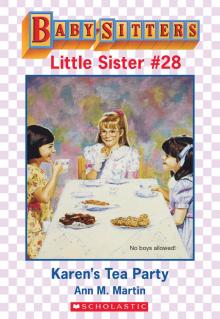 Karen's Tea Party
Karen's Tea Party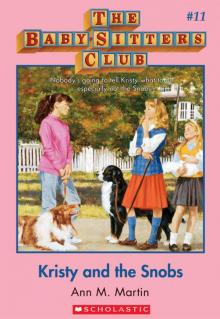 Kristy and the Snobs
Kristy and the Snobs Best Kept Secret
Best Kept Secret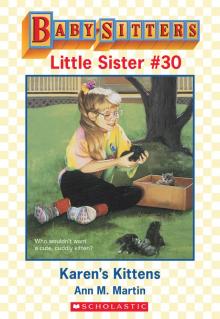 Karen's Kittens
Karen's Kittens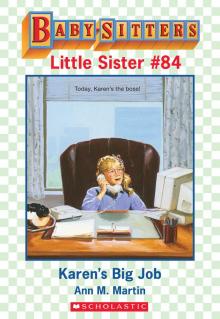 Karen's Big Job
Karen's Big Job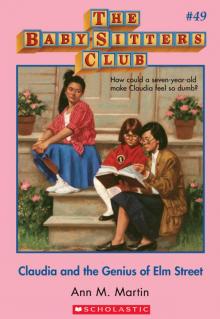 Claudia and the Genius of Elm Street
Claudia and the Genius of Elm Street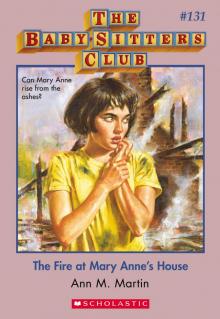 The Fire at Mary Anne's House
The Fire at Mary Anne's House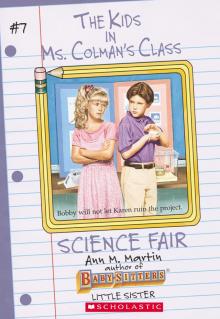 Science Fair
Science Fair Me and Katie (The Pest)
Me and Katie (The Pest)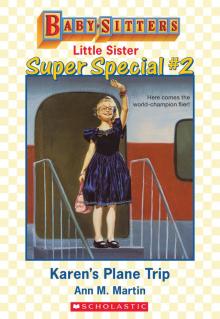 Karen's Plane Trip
Karen's Plane Trip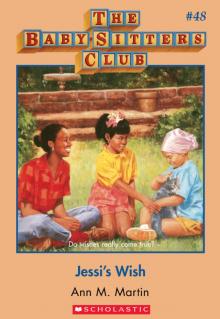 Jessi's Wish
Jessi's Wish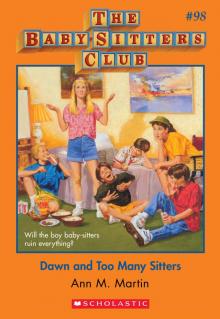 Dawn and Too Many Sitters
Dawn and Too Many Sitters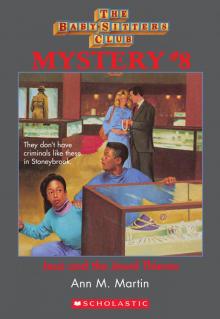 Jessi and the Jewel Thieves
Jessi and the Jewel Thieves Eleven Kids, One Summer
Eleven Kids, One Summer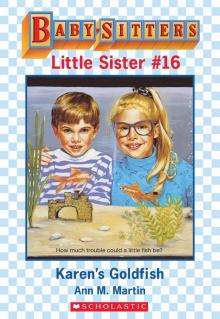 Karen's Goldfish
Karen's Goldfish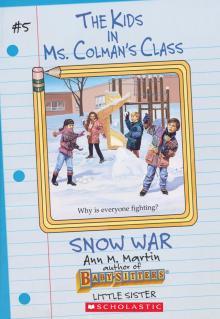 Snow War
Snow War Abby and the Secret Society
Abby and the Secret Society Keeping Secrets
Keeping Secrets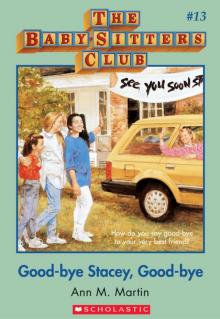 Good-Bye Stacey, Good-Bye
Good-Bye Stacey, Good-Bye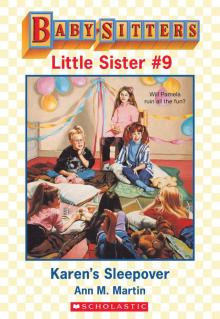 Karen's Sleepover
Karen's Sleepover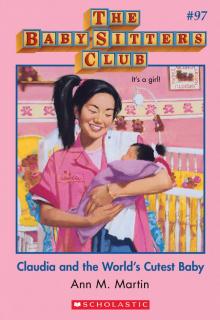 Claudia and the World's Cutest Baby
Claudia and the World's Cutest Baby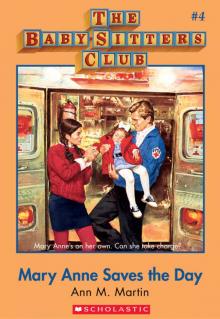 Mary Anne Saves the Day
Mary Anne Saves the Day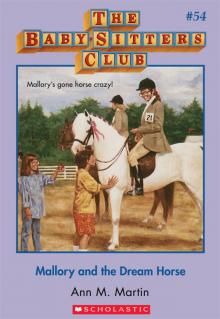 Mallory and the Dream Horse
Mallory and the Dream Horse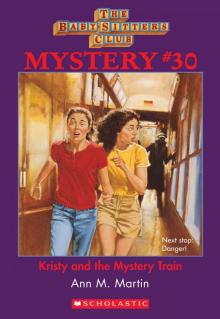 Kristy and the Mystery Train
Kristy and the Mystery Train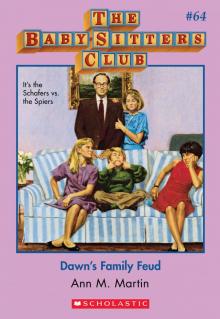 Dawn's Family Feud
Dawn's Family Feud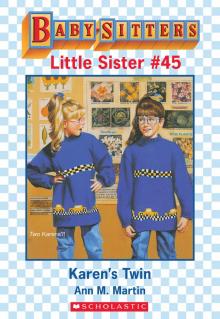 Karen's Twin
Karen's Twin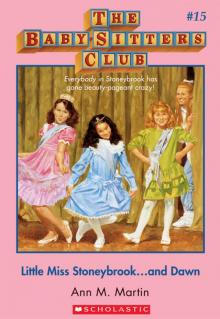 Little Miss Stoneybrook... And Dawn
Little Miss Stoneybrook... And Dawn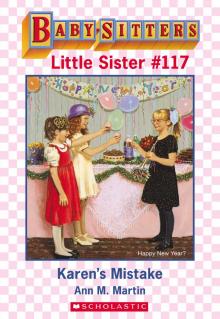 Karen's Mistake
Karen's Mistake Karen's Movie Star
Karen's Movie Star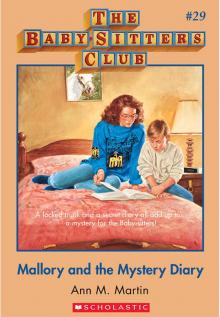 Mallory and the Mystery Diary
Mallory and the Mystery Diary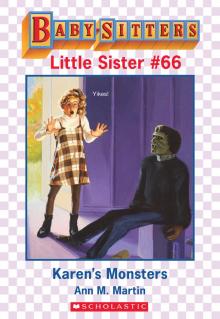 Karen's Monsters
Karen's Monsters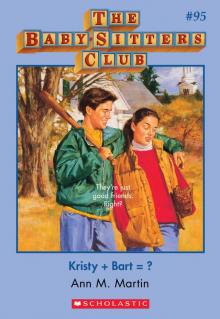 Kristy + Bart = ?
Kristy + Bart = ?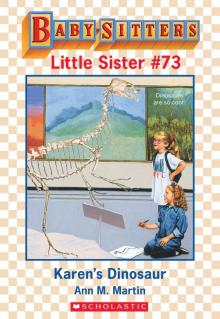 Karen's Dinosaur
Karen's Dinosaur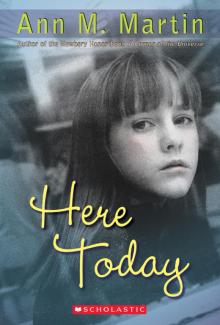 Here Today
Here Today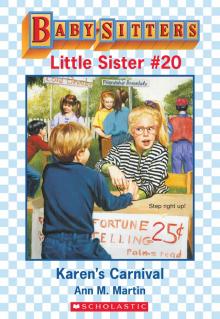 Karen's Carnival
Karen's Carnival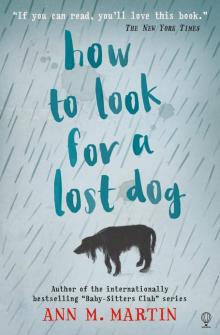 How to Look for a Lost Dog
How to Look for a Lost Dog Stacey vs. Claudia
Stacey vs. Claudia Stacey's Ex-Boyfriend
Stacey's Ex-Boyfriend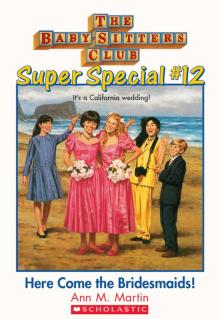 Here Come the Bridesmaids!
Here Come the Bridesmaids! Graduation Day
Graduation Day Kristy's Big News
Kristy's Big News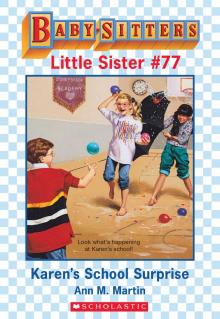 Karen's School Surprise
Karen's School Surprise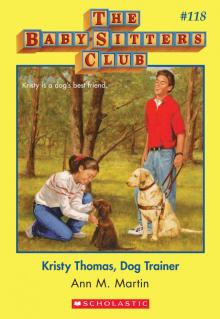 Kristy Thomas, Dog Trainer
Kristy Thomas, Dog Trainer Baby-Sitters' Christmas Chiller
Baby-Sitters' Christmas Chiller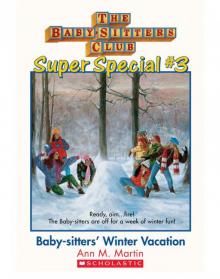 Baby-Sitters' Winter Vacation
Baby-Sitters' Winter Vacation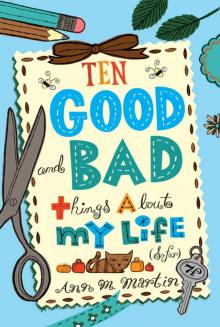 Ten Good and Bad Things About My Life
Ten Good and Bad Things About My Life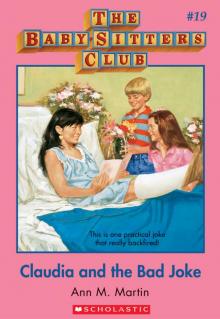 Claudia and the Bad Joke
Claudia and the Bad Joke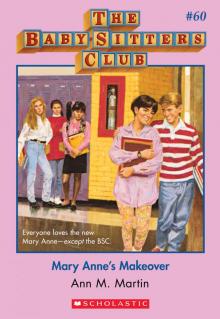 Mary Anne's Makeover
Mary Anne's Makeover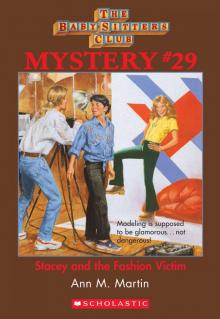 Stacey and the Fashion Victim
Stacey and the Fashion Victim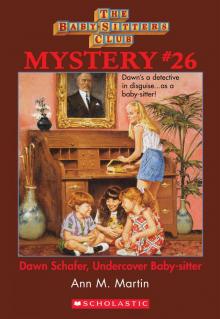 Dawn Schafer, Undercover Baby-Sitter
Dawn Schafer, Undercover Baby-Sitter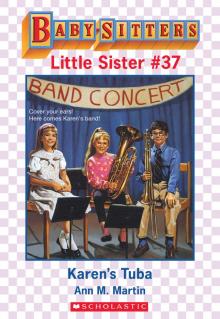 Karen's Tuba
Karen's Tuba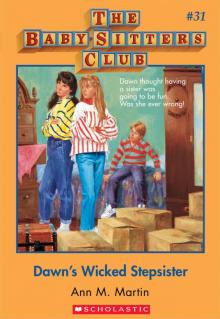 Dawn's Wicked Stepsister
Dawn's Wicked Stepsister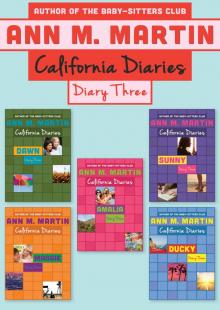 Diary Three: Dawn, Sunny, Maggie, Amalia, and Ducky
Diary Three: Dawn, Sunny, Maggie, Amalia, and Ducky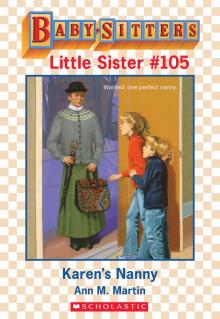 Karen's Nanny
Karen's Nanny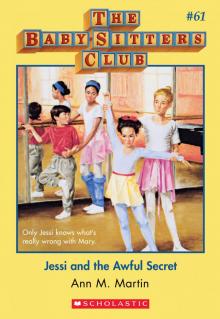 Jessi and the Awful Secret
Jessi and the Awful Secret Karen's New Year
Karen's New Year Karen's Candy
Karen's Candy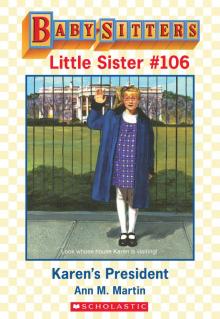 Karen's President
Karen's President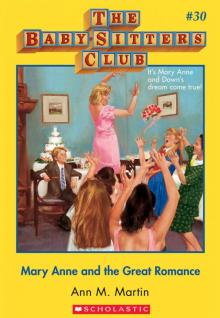 Mary Anne and the Great Romance
Mary Anne and the Great Romance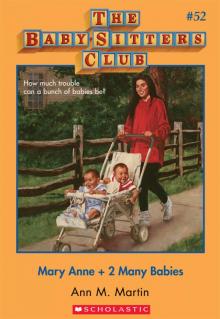 Mary Anne + 2 Many Babies
Mary Anne + 2 Many Babies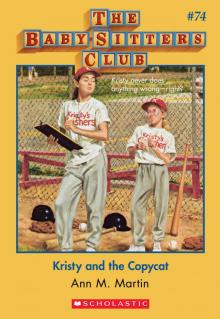 Kristy and the Copycat
Kristy and the Copycat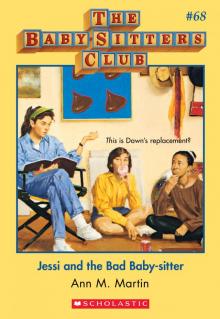 Jessi and the Bad Baby-Sitter
Jessi and the Bad Baby-Sitter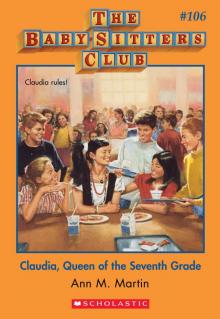 Claudia, Queen of the Seventh Grade
Claudia, Queen of the Seventh Grade Claudia and the Lighthouse Ghost
Claudia and the Lighthouse Ghost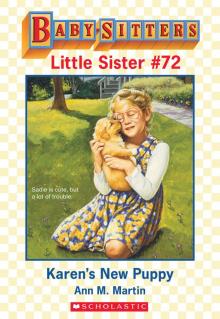 Karen's New Puppy
Karen's New Puppy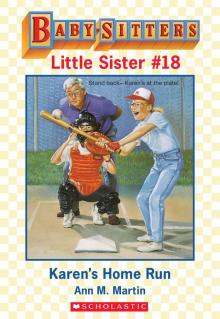 Karen's Home Run
Karen's Home Run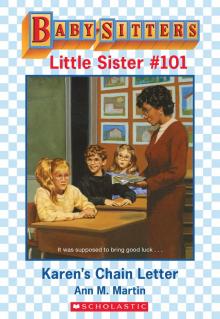 Karen's Chain Letter
Karen's Chain Letter Kristy in Charge
Kristy in Charge Karen's Angel
Karen's Angel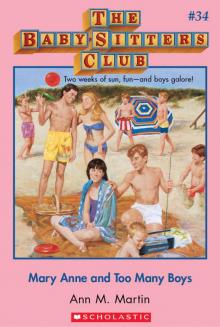 Mary Anne and Too Many Boys
Mary Anne and Too Many Boys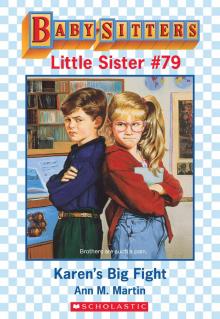 Karen's Big Fight
Karen's Big Fight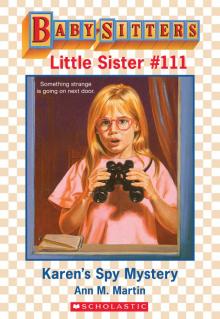 Karen's Spy Mystery
Karen's Spy Mystery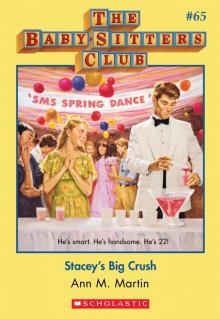 Stacey's Big Crush
Stacey's Big Crush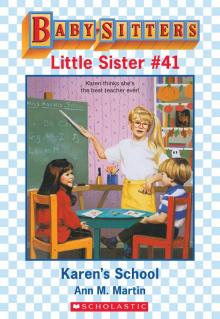 Karen's School
Karen's School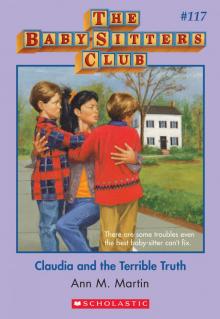 Claudia and the Terrible Truth
Claudia and the Terrible Truth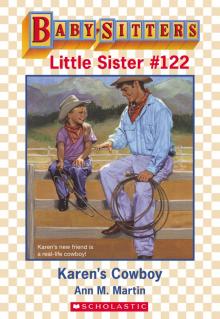 Karen's Cowboy
Karen's Cowboy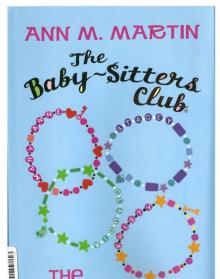 The Summer Before
The Summer Before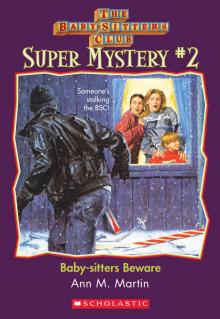 Beware, Dawn!
Beware, Dawn! Belle Teale
Belle Teale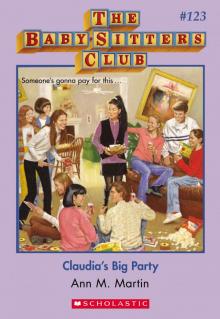 Claudia's Big Party
Claudia's Big Party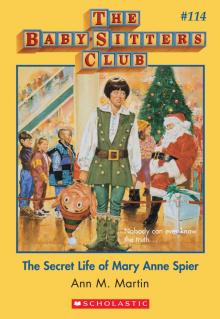 The Secret Life of Mary Anne Spier
The Secret Life of Mary Anne Spier Karen's Book
Karen's Book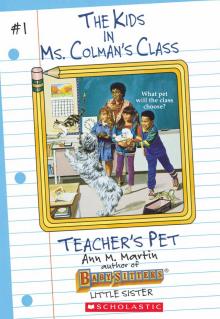 Teacher's Pet
Teacher's Pet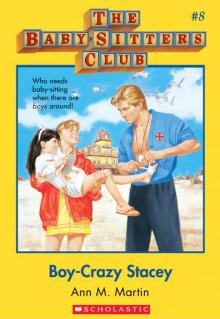 Boy-Crazy Stacey
Boy-Crazy Stacey Claudia and the Disaster Date
Claudia and the Disaster Date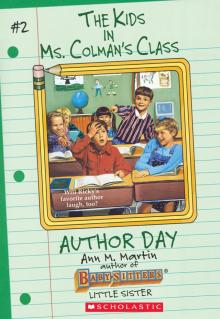 Author Day
Author Day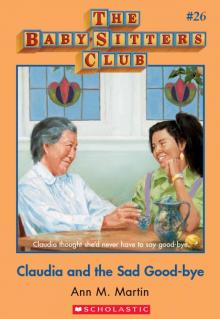 Claudia and the Sad Good-Bye
Claudia and the Sad Good-Bye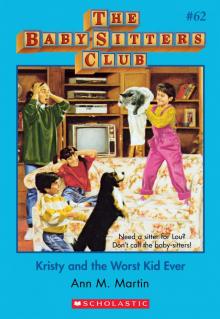 Kristy and the Worst Kid Ever
Kristy and the Worst Kid Ever Yours Turly, Shirley
Yours Turly, Shirley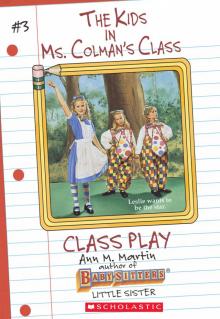 Class Play
Class Play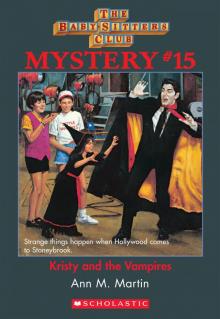 Kristy and the Vampires
Kristy and the Vampires Kristy and the Cat Burglar
Kristy and the Cat Burglar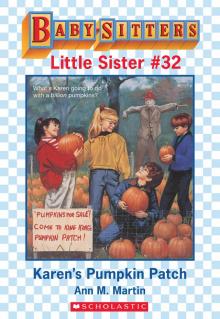 Karen's Pumpkin Patch
Karen's Pumpkin Patch Stacey and the Mystery at the Empty House
Stacey and the Mystery at the Empty House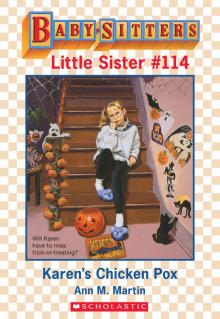 Karen's Chicken Pox
Karen's Chicken Pox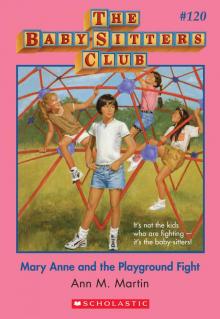 Mary Anne and the Playground Fight
Mary Anne and the Playground Fight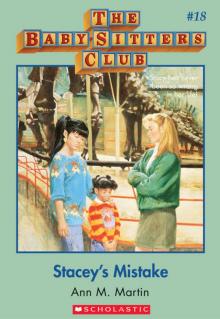 Stacey's Mistake
Stacey's Mistake Coming Apart
Coming Apart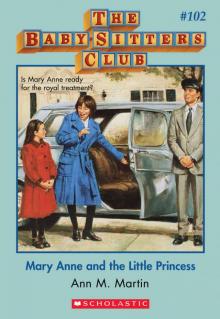 Mary Anne and the Little Princess
Mary Anne and the Little Princess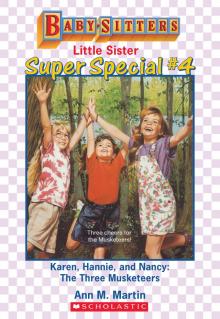 Karen, Hannie and Nancy: The Three Musketeers
Karen, Hannie and Nancy: The Three Musketeers 'Tis the Season
'Tis the Season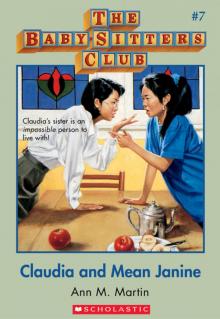 Claudia and Mean Janine
Claudia and Mean Janine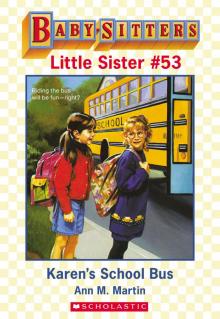 Karen's School Bus
Karen's School Bus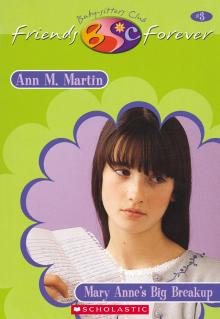 Mary Anne's Big Breakup
Mary Anne's Big Breakup Rain Reign
Rain Reign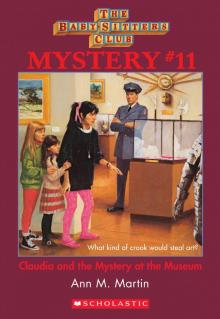 Claudia and the Mystery at the Museum
Claudia and the Mystery at the Museum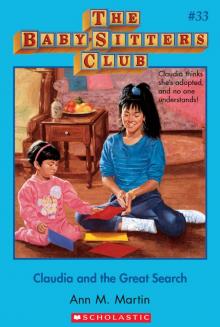 Claudia and the Great Search
Claudia and the Great Search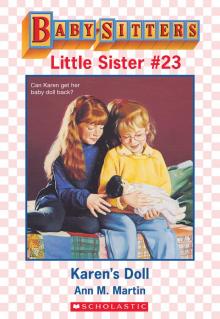 Karen's Doll
Karen's Doll Shannon's Story
Shannon's Story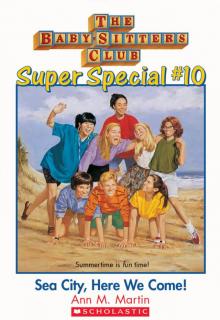 Sea City, Here We Come!
Sea City, Here We Come!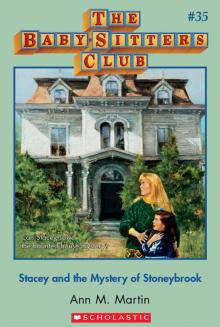 Stacey and the Mystery of Stoneybrook
Stacey and the Mystery of Stoneybrook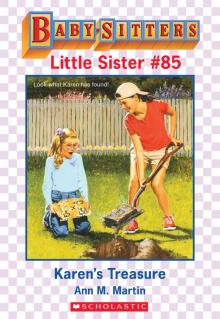 Karen's Treasure
Karen's Treasure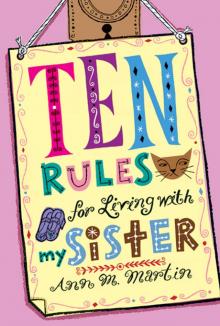 Ten Rules for Living With My Sister
Ten Rules for Living With My Sister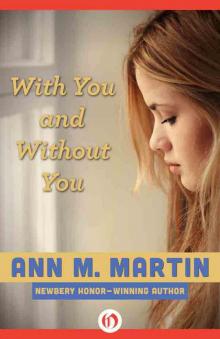 With You and Without You
With You and Without You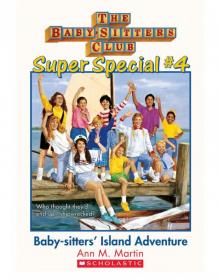 Baby-Sitters' Island Adventure
Baby-Sitters' Island Adventure Karen's Fishing Trip
Karen's Fishing Trip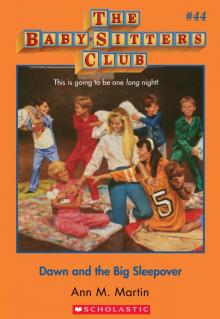 Dawn and the Big Sleepover
Dawn and the Big Sleepover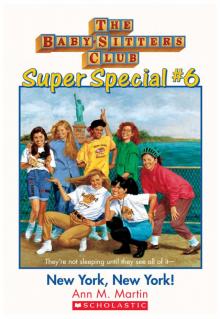 New York, New York!
New York, New York!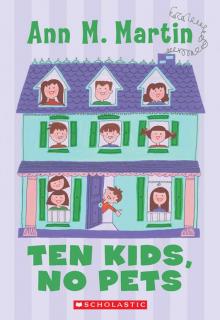 Ten Kids, No Pets
Ten Kids, No Pets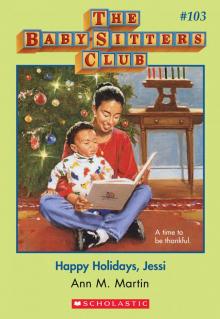 Happy Holidays, Jessi
Happy Holidays, Jessi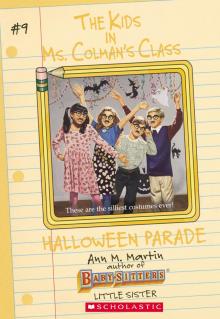 Halloween Parade
Halloween Parade Karen's New Holiday
Karen's New Holiday Kristy Power!
Kristy Power!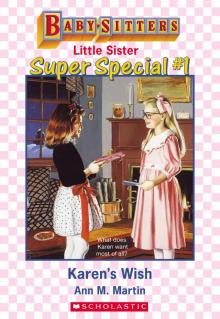 Karen's Wish
Karen's Wish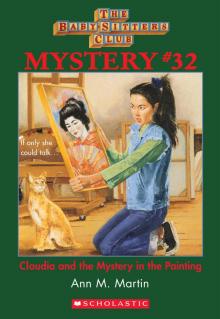 Claudia and the Mystery in the Painting
Claudia and the Mystery in the Painting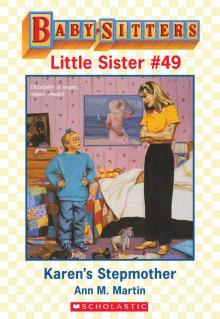 Karen's Stepmother
Karen's Stepmother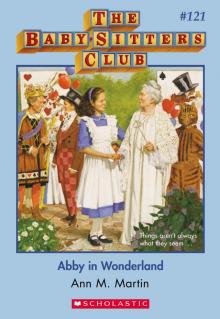 Abby in Wonderland
Abby in Wonderland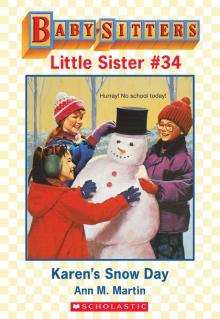 Karen's Snow Day
Karen's Snow Day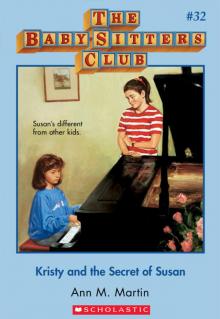 Kristy and the Secret of Susan
Kristy and the Secret of Susan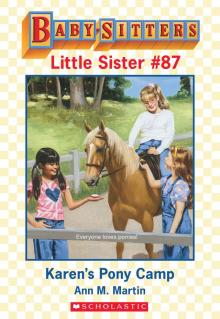 Karen's Pony Camp
Karen's Pony Camp Karen's School Trip
Karen's School Trip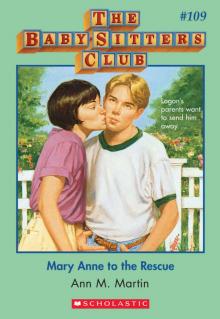 Mary Anne to the Rescue
Mary Anne to the Rescue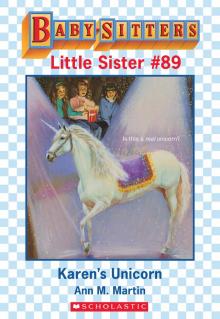 Karen's Unicorn
Karen's Unicorn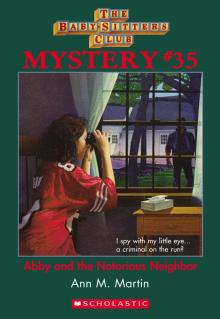 Abby and the Notorious Neighbor
Abby and the Notorious Neighbor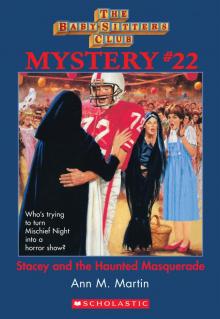 Stacey and the Haunted Masquerade
Stacey and the Haunted Masquerade Claudia Gets Her Guy
Claudia Gets Her Guy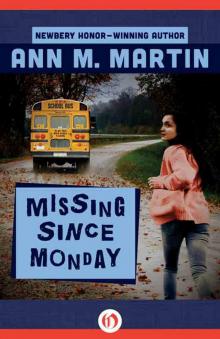 Missing Since Monday
Missing Since Monday Stacey's Choice
Stacey's Choice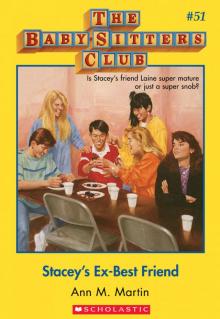 Stacey's Ex-Best Friend
Stacey's Ex-Best Friend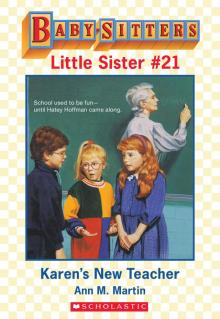 Karen's New Teacher
Karen's New Teacher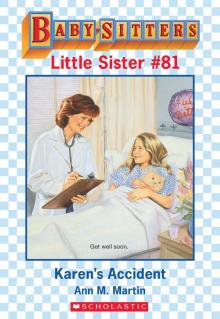 Karen's Accident
Karen's Accident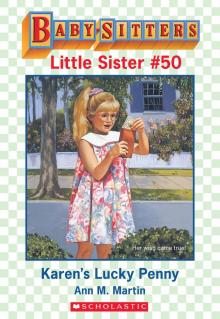 Karen's Lucky Penny
Karen's Lucky Penny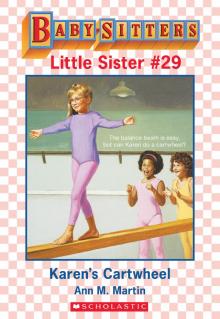 Karen's Cartwheel
Karen's Cartwheel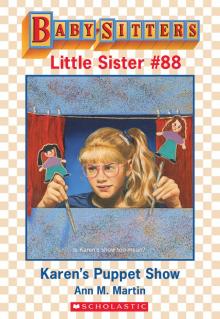 Karen's Puppet Show
Karen's Puppet Show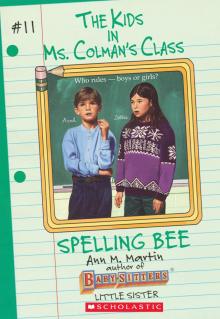 Spelling Bee
Spelling Bee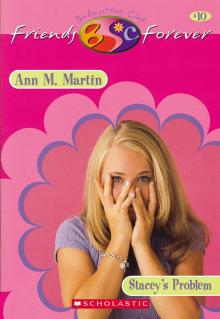 Stacey's Problem
Stacey's Problem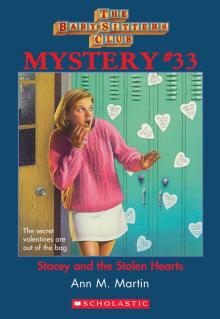 Stacey and the Stolen Hearts
Stacey and the Stolen Hearts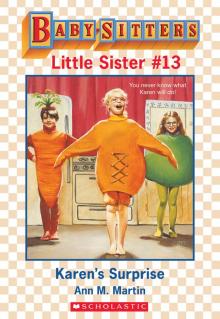 Karen's Surprise
Karen's Surprise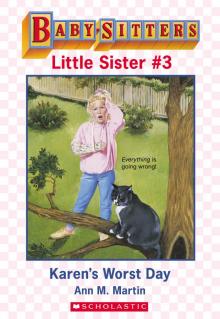 Karen's Worst Day
Karen's Worst Day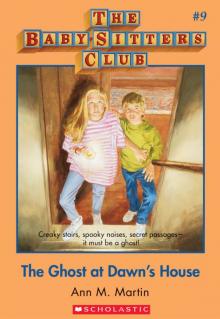 The Ghost at Dawn's House
The Ghost at Dawn's House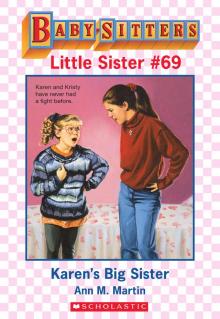 Karen's Big Sister
Karen's Big Sister Karen's Easter Parade
Karen's Easter Parade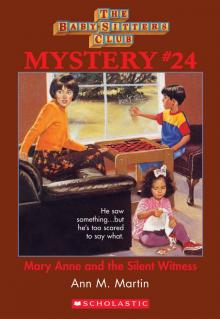 Mary Anne and the Silent Witness
Mary Anne and the Silent Witness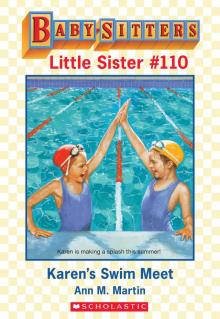 Karen's Swim Meet
Karen's Swim Meet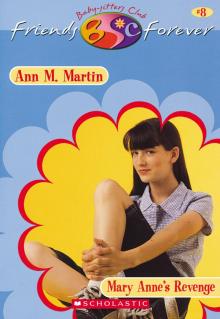 Mary Anne's Revenge
Mary Anne's Revenge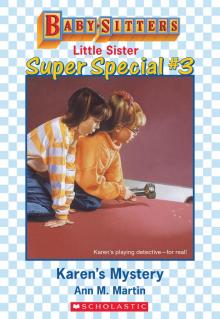 Karen's Mystery
Karen's Mystery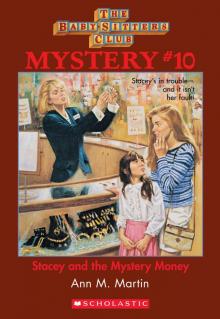 Stacey and the Mystery Money
Stacey and the Mystery Money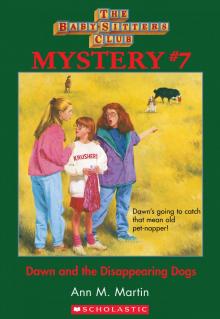 Dawn and the Disappearing Dogs
Dawn and the Disappearing Dogs Karen's Christmas Tree
Karen's Christmas Tree Welcome to Camden Falls
Welcome to Camden Falls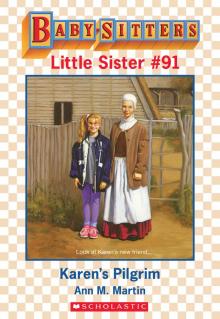 Karen's Pilgrim
Karen's Pilgrim Dawn and the Halloween Mystery
Dawn and the Halloween Mystery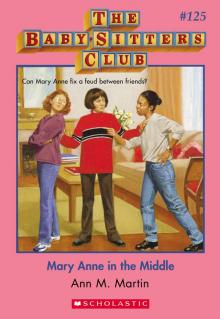 Mary Anne in the Middle
Mary Anne in the Middle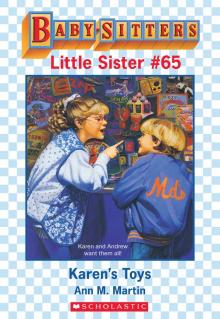 Karen's Toys
Karen's Toys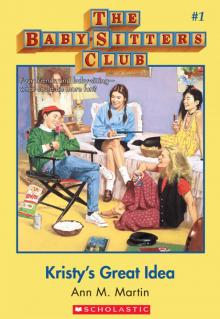 Kristy's Great Idea
Kristy's Great Idea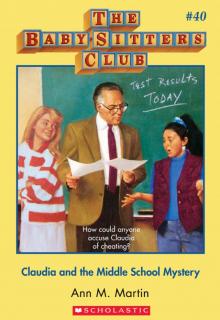 Claudia and the Middle School Mystery
Claudia and the Middle School Mystery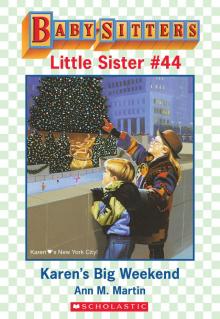 Karen's Big Weekend
Karen's Big Weekend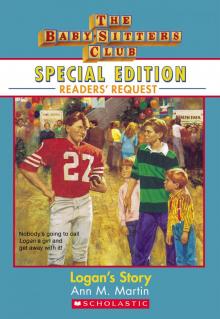 Logan's Story
Logan's Story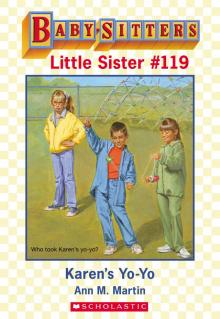 Karen's Yo-Yo
Karen's Yo-Yo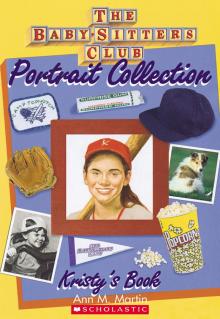 Kristy's Book
Kristy's Book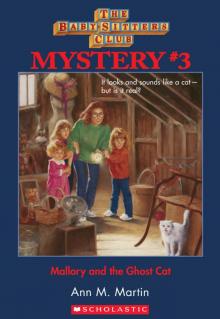 Mallory and the Ghost Cat
Mallory and the Ghost Cat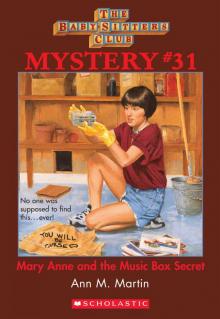 Mary Anne and the Music
Mary Anne and the Music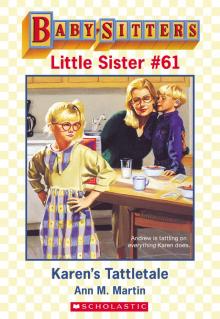 Karen's Tattletale
Karen's Tattletale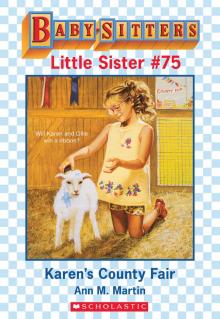 Karen's County Fair
Karen's County Fair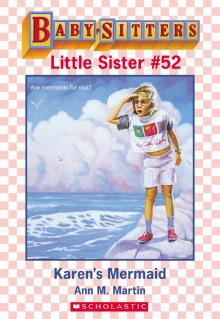 Karen's Mermaid
Karen's Mermaid Snowbound
Snowbound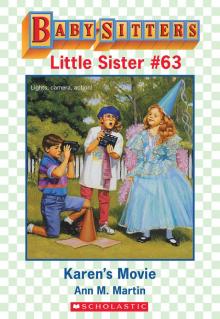 Karen's Movie
Karen's Movie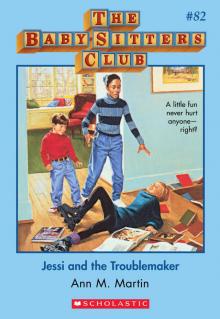 Jessi and the Troublemaker
Jessi and the Troublemaker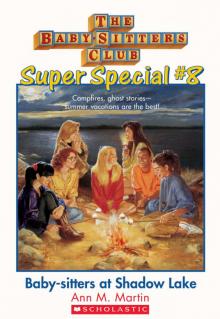 Baby-Sitters at Shadow Lake
Baby-Sitters at Shadow Lake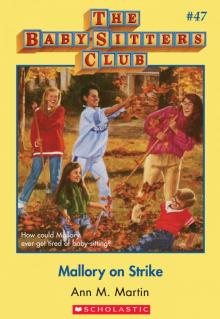 Mallory on Strike
Mallory on Strike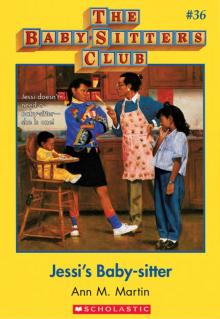 Jessi's Baby-Sitter
Jessi's Baby-Sitter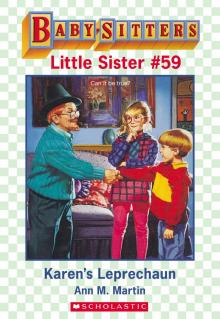 Karen's Leprechaun
Karen's Leprechaun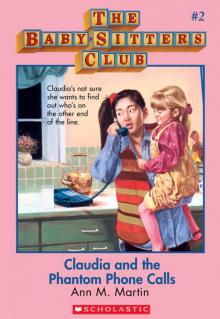 Claudia and the Phantom Phone Calls
Claudia and the Phantom Phone Calls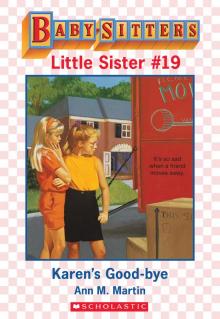 Karen's Good-Bye
Karen's Good-Bye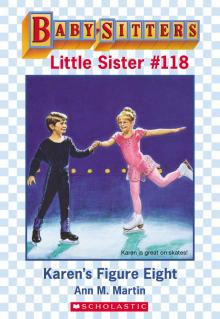 Karen's Figure Eight
Karen's Figure Eight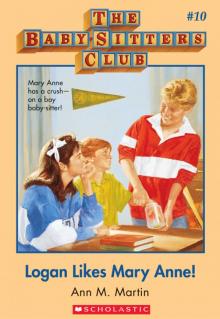 Logan Likes Mary Anne!
Logan Likes Mary Anne!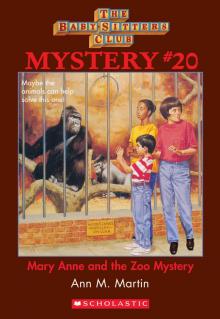 Mary Anne and the Zoo Mystery
Mary Anne and the Zoo Mystery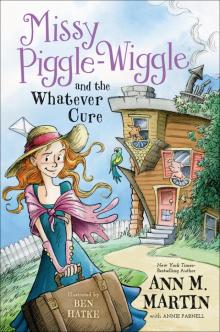 Missy Piggle-Wiggle and the Whatever Cure
Missy Piggle-Wiggle and the Whatever Cure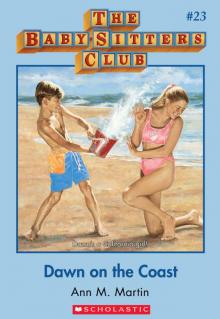 Dawn on the Coast
Dawn on the Coast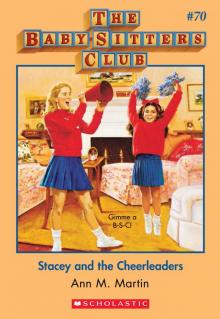 Stacey and the Cheerleaders
Stacey and the Cheerleaders Claudia and the Clue in the Photograph
Claudia and the Clue in the Photograph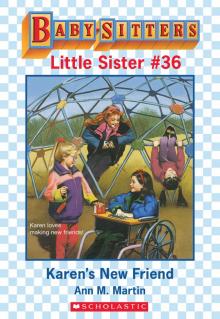 Karen's New Friend
Karen's New Friend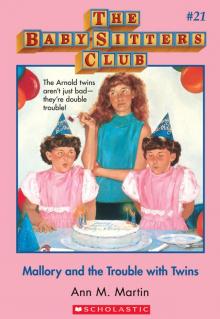 Mallory and the Trouble With Twins
Mallory and the Trouble With Twins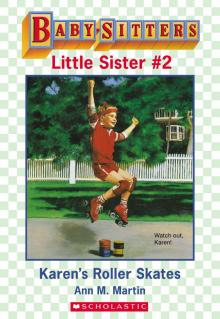 Karen's Roller Skates
Karen's Roller Skates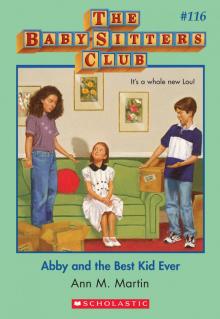 Abby and the Best Kid Ever
Abby and the Best Kid Ever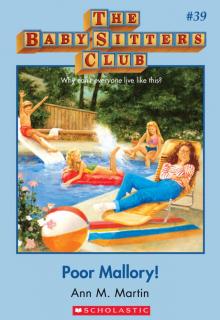 Poor Mallory!
Poor Mallory!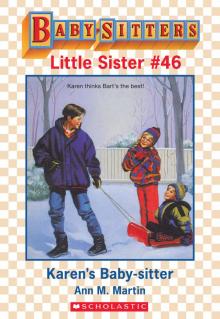 Karen's Witch
Karen's Witch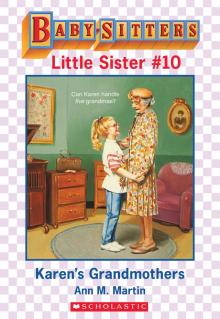 Karen's Grandmothers
Karen's Grandmothers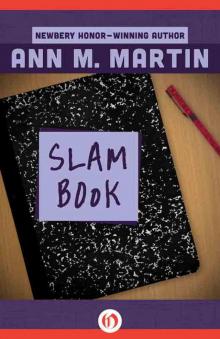 Slam Book
Slam Book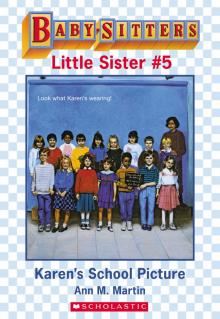 Karen's School Picture
Karen's School Picture Karen's Reindeer
Karen's Reindeer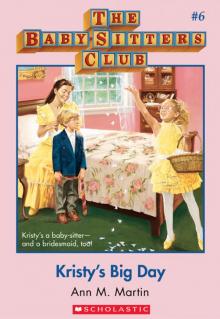 Kristy's Big Day
Kristy's Big Day The Long Way Home
The Long Way Home Karen's Sleigh Ride
Karen's Sleigh Ride On Christmas Eve
On Christmas Eve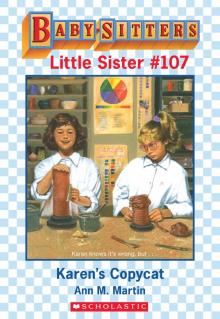 Karen's Copycat
Karen's Copycat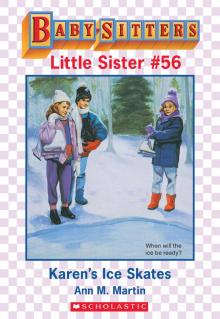 Karen's Ice Skates
Karen's Ice Skates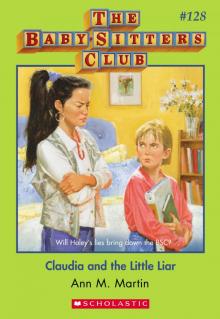 Claudia and the Little Liar
Claudia and the Little Liar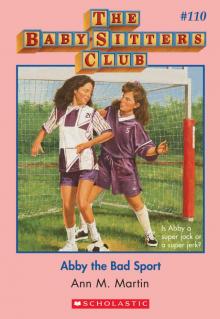 Abby the Bad Sport
Abby the Bad Sport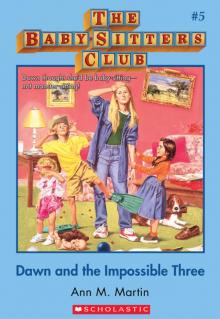 The Baby-Sitters Club #5: Dawn and the Impossible Three
The Baby-Sitters Club #5: Dawn and the Impossible Three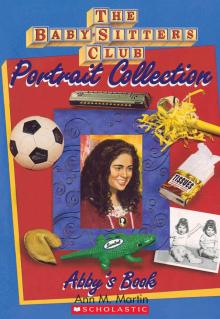 Abby's Book
Abby's Book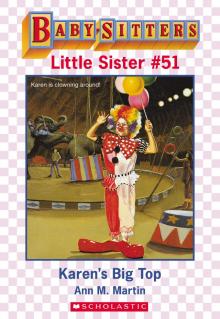 Karen's Big Top
Karen's Big Top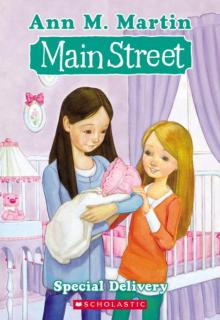 Main Street #8: Special Delivery
Main Street #8: Special Delivery Kristy and the Kidnapper
Kristy and the Kidnapper Karen's Ski Trip
Karen's Ski Trip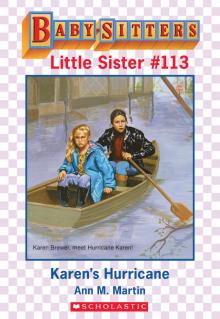 Karen's Hurricane
Karen's Hurricane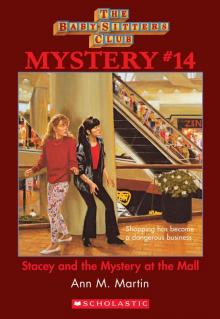 Stacey and the Mystery at the Mall
Stacey and the Mystery at the Mall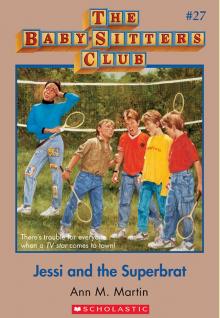 Jessi and the Superbrat
Jessi and the Superbrat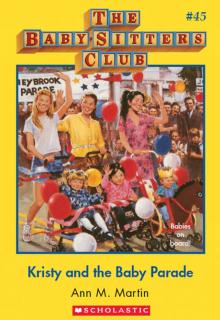 Kristy and the Baby Parade
Kristy and the Baby Parade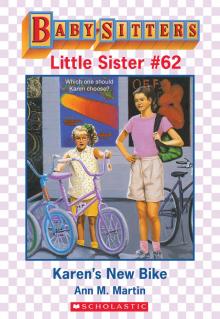 Karen's New Bike
Karen's New Bike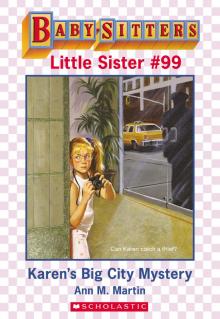 Karen's Big City Mystery
Karen's Big City Mystery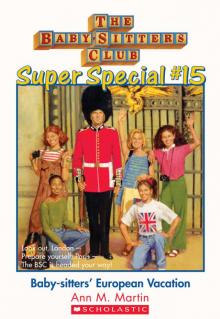 Baby-Sitters' European Vacation
Baby-Sitters' European Vacation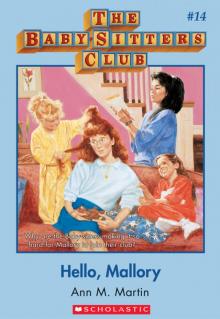 Hello, Mallory
Hello, Mallory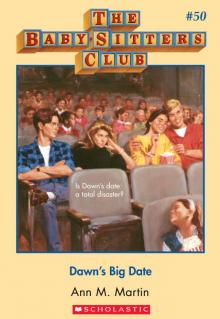 Dawn's Big Date
Dawn's Big Date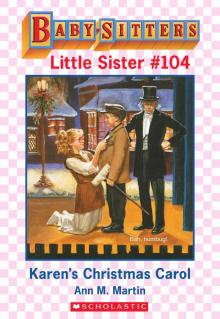 Karen's Christmas Carol
Karen's Christmas Carol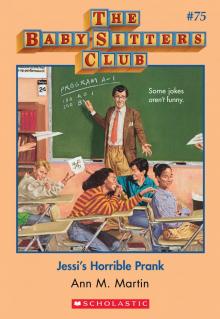 Jessi's Horrible Prank
Jessi's Horrible Prank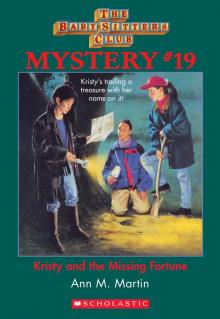 Kristy and the Missing Fortune
Kristy and the Missing Fortune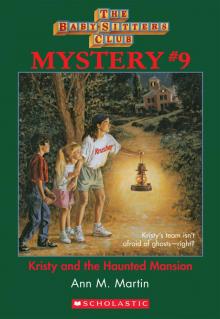 Kristy and the Haunted Mansion
Kristy and the Haunted Mansion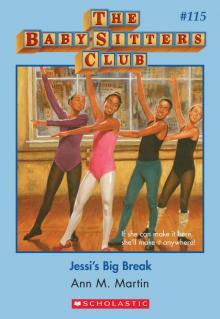 Jessi's Big Break
Jessi's Big Break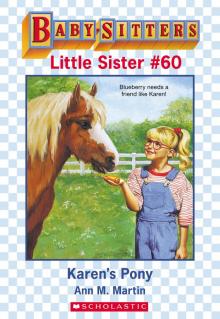 Karen's Pony
Karen's Pony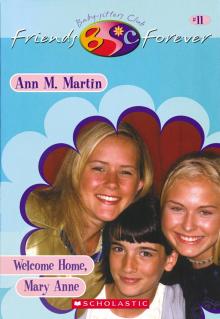 Welcome Home, Mary Anne
Welcome Home, Mary Anne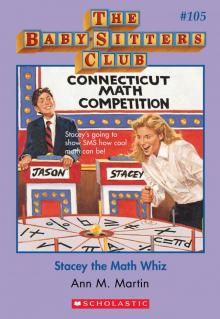 Stacey the Math Whiz
Stacey the Math Whiz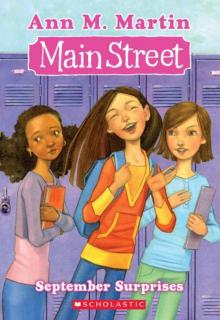 September Surprises
September Surprises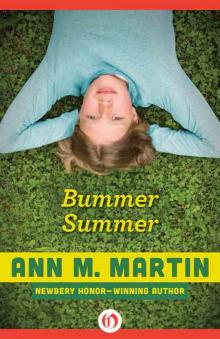 Bummer Summer
Bummer Summer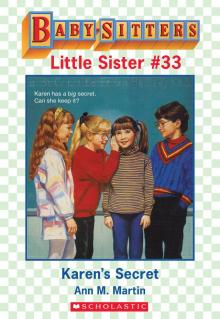 Karen's Secret
Karen's Secret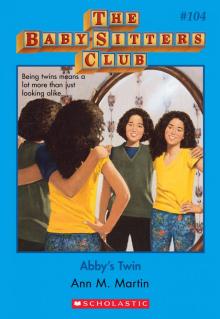 Abby's Twin
Abby's Twin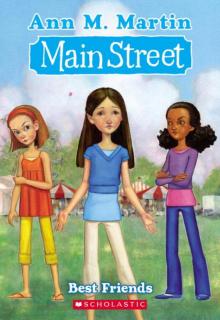 Main Street #4: Best Friends
Main Street #4: Best Friends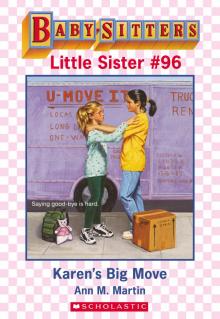 Karen's Big Move
Karen's Big Move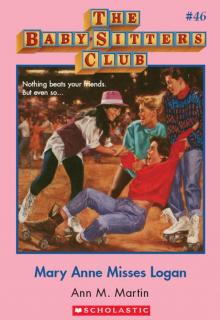 Mary Anne Misses Logan
Mary Anne Misses Logan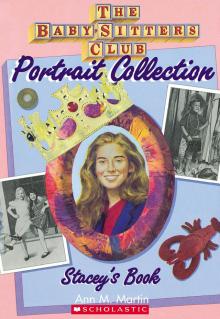 Stacey's Book
Stacey's Book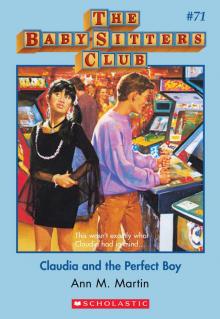 Claudia and the Perfect Boy
Claudia and the Perfect Boy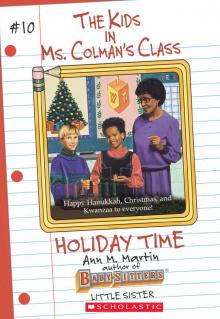 Holiday Time
Holiday Time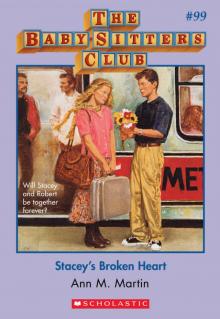 Stacey's Broken Heart
Stacey's Broken Heart Karen's Field Day
Karen's Field Day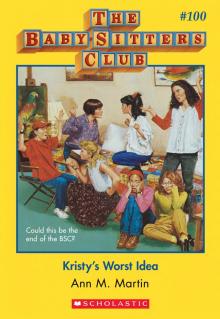 Kristy's Worst Idea
Kristy's Worst Idea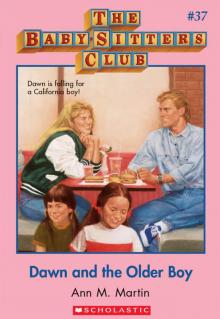 Dawn and the Older Boy
Dawn and the Older Boy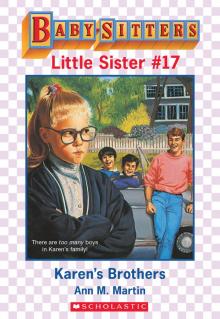 Karen's Brothers
Karen's Brothers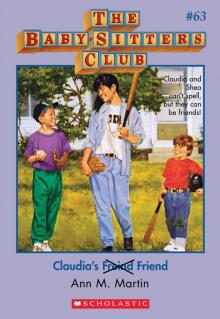 Claudia's Friend
Claudia's Friend Mary Anne and the Haunted Bookstore
Mary Anne and the Haunted Bookstore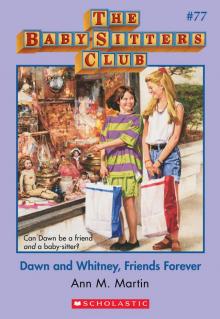 Dawn and Whitney, Friends Forever
Dawn and Whitney, Friends Forever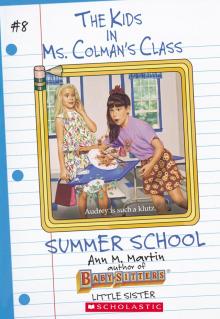 Summer School
Summer School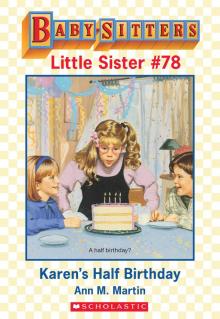 Karen's Birthday
Karen's Birthday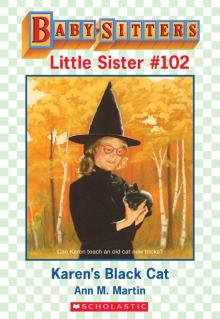 Karen's Black Cat
Karen's Black Cat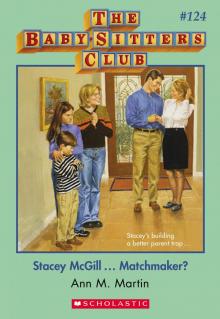 Stacey McGill... Matchmaker?
Stacey McGill... Matchmaker?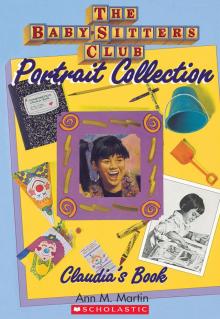 Claudia's Book
Claudia's Book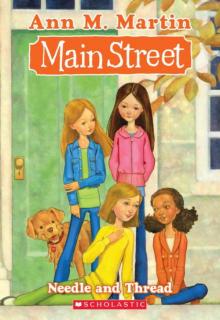 Main Street #2: Needle and Thread
Main Street #2: Needle and Thread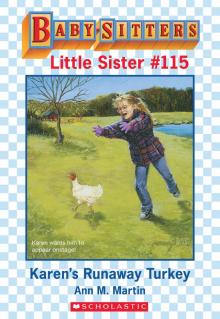 Karen's Runaway Turkey
Karen's Runaway Turkey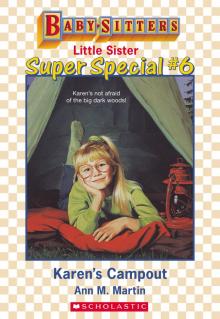 Karen's Campout
Karen's Campout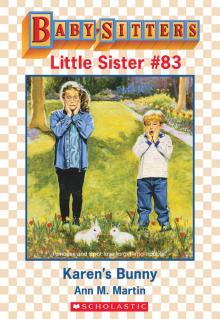 Karen's Bunny
Karen's Bunny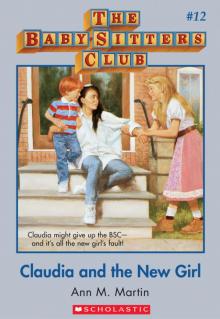 Claudia and the New Girl
Claudia and the New Girl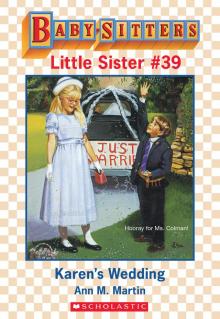 Karen's Wedding
Karen's Wedding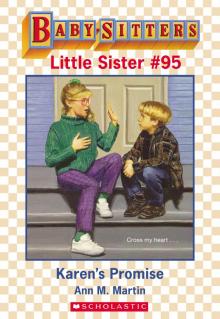 Karen's Promise
Karen's Promise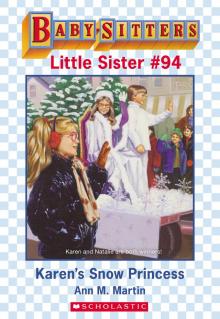 Karen's Snow Princess
Karen's Snow Princess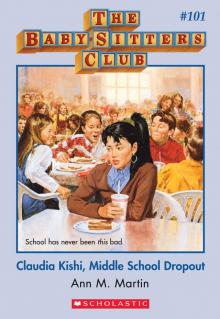 Claudia Kishi, Middle School Dropout
Claudia Kishi, Middle School Dropout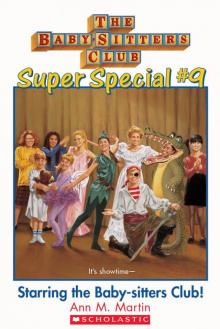 Starring the Baby-Sitters Club!
Starring the Baby-Sitters Club!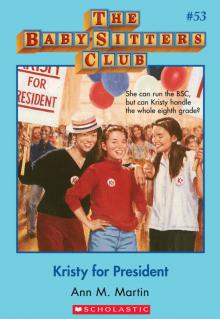 Kristy for President
Kristy for President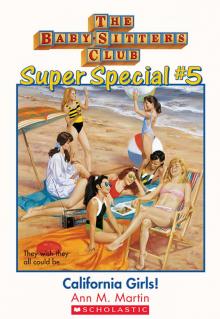 California Girls!
California Girls!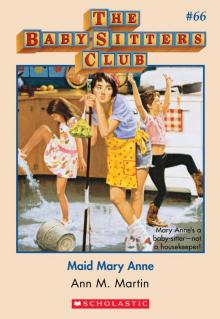 Maid Mary Anne
Maid Mary Anne Abby's Un-Valentine
Abby's Un-Valentine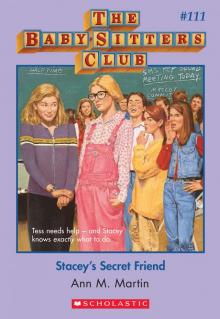 Stacey's Secret Friend
Stacey's Secret Friend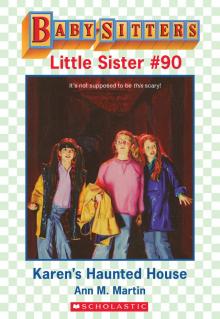 Karen's Haunted House
Karen's Haunted House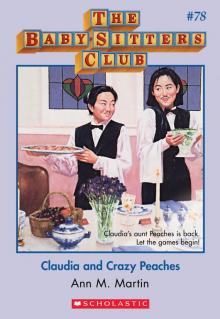 Claudia and Crazy Peaches
Claudia and Crazy Peaches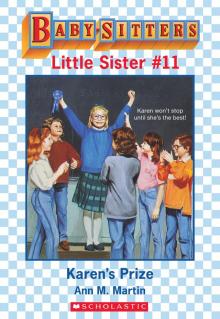 Karen's Prize
Karen's Prize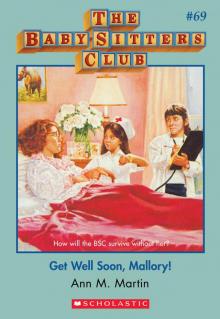 Get Well Soon, Mallory!
Get Well Soon, Mallory!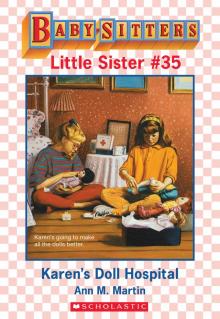 Karen's Doll Hospital
Karen's Doll Hospital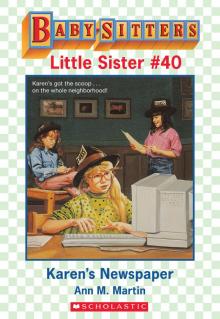 Karen's Newspaper
Karen's Newspaper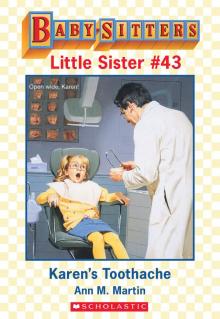 Karen's Toothache
Karen's Toothache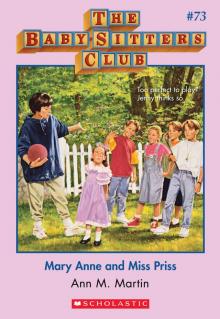 Mary Anne and Miss Priss
Mary Anne and Miss Priss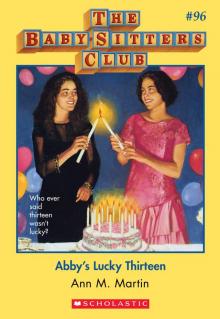 Abby's Lucky Thirteen
Abby's Lucky Thirteen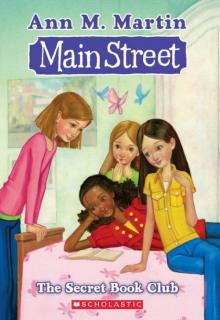 The Secret Book Club
The Secret Book Club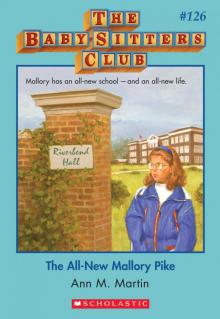 The All-New Mallory Pike
The All-New Mallory Pike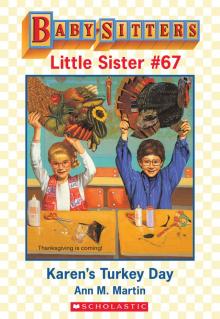 Karen's Turkey Day
Karen's Turkey Day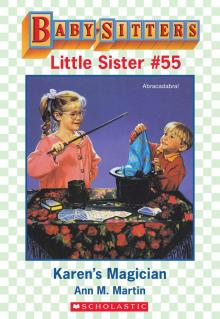 Karen's Magician
Karen's Magician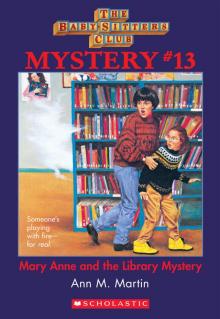 Mary Anne and the Library Mystery
Mary Anne and the Library Mystery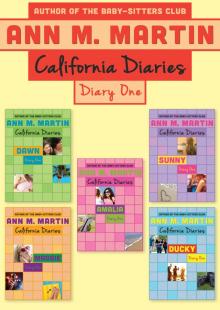 Diary One: Dawn, Sunny, Maggie, Amalia, and Ducky
Diary One: Dawn, Sunny, Maggie, Amalia, and Ducky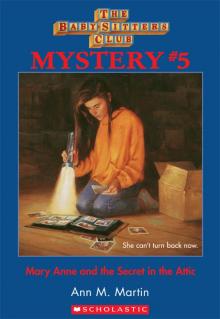 Mary Anne and the Secret in the Attic
Mary Anne and the Secret in the Attic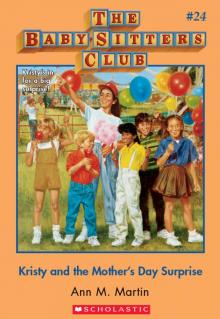 Kristy and the Mother's Day Surprise
Kristy and the Mother's Day Surprise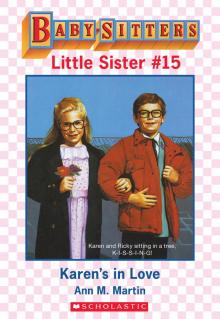 Karen's in Love
Karen's in Love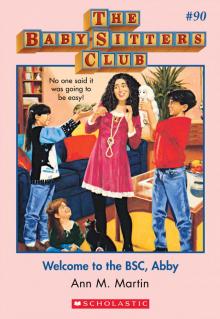 Welcome to the BSC, Abby
Welcome to the BSC, Abby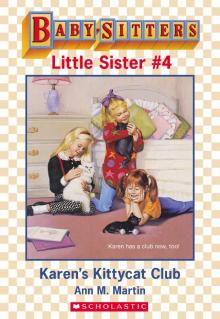 Karen's Kittycat Club
Karen's Kittycat Club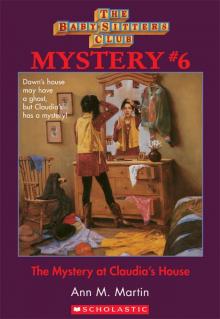 The Mystery at Claudia's House
The Mystery at Claudia's House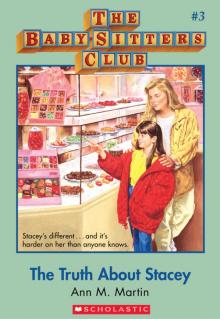 The Truth About Stacey
The Truth About Stacey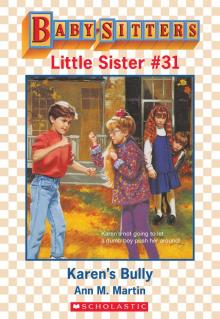 Karen's Bully
Karen's Bully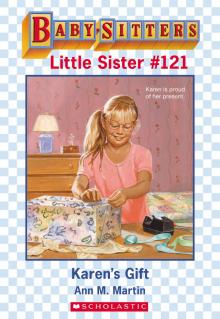 Karen's Gift
Karen's Gift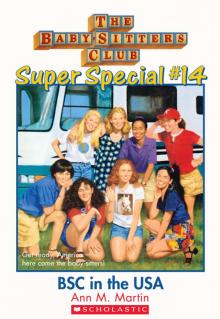 BSC in the USA
BSC in the USA Everything for a Dog
Everything for a Dog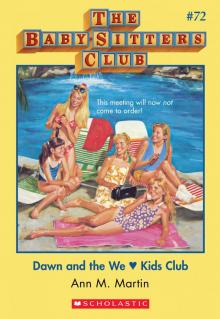 Dawn and the We Love Kids Club
Dawn and the We Love Kids Club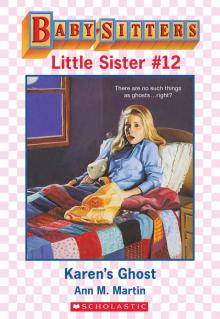 Karen's Ghost
Karen's Ghost Stacey's Lie
Stacey's Lie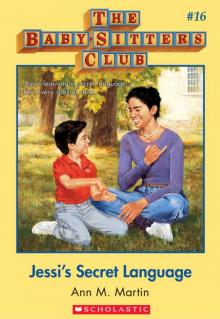 Jessi's Secret Language
Jessi's Secret Language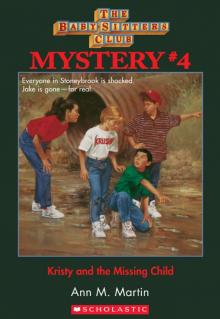 Kristy and the Missing Child
Kristy and the Missing Child Better to Wish
Better to Wish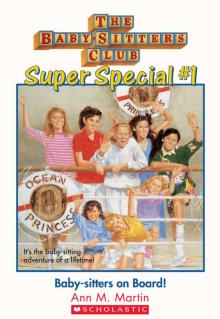 Baby-Sitters on Board!
Baby-Sitters on Board!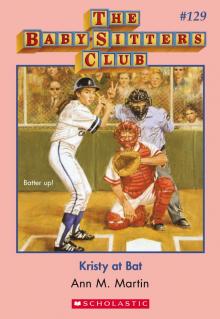 Kristy at Bat
Kristy at Bat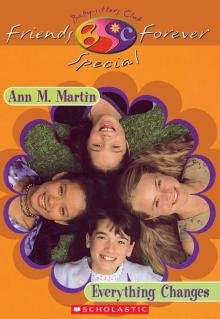 Everything Changes
Everything Changes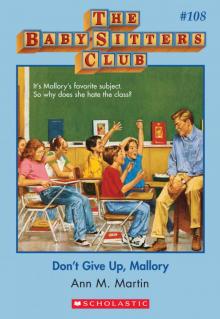 Don't Give Up, Mallory
Don't Give Up, Mallory A Dog's Life: The Autobiography of a Stray
A Dog's Life: The Autobiography of a Stray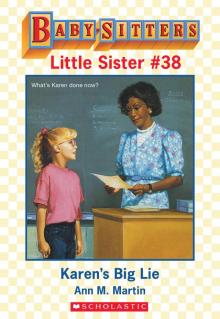 Karen's Big Lie
Karen's Big Lie Karen's Show and Share
Karen's Show and Share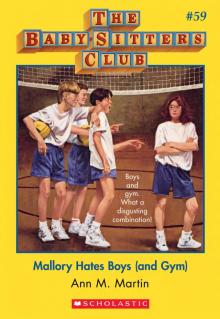 Mallory Hates Boys (and Gym)
Mallory Hates Boys (and Gym)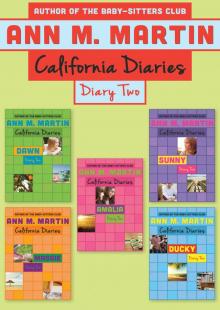 Diary Two: Dawn, Sunny, Maggie, Amalia, and Ducky
Diary Two: Dawn, Sunny, Maggie, Amalia, and Ducky Karen's Pen Pal
Karen's Pen Pal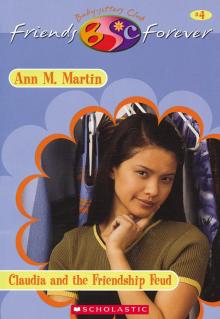 Claudia and the Friendship Feud
Claudia and the Friendship Feud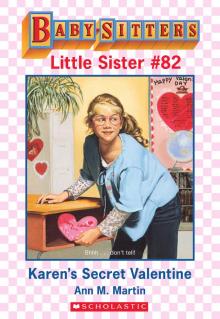 Karen's Secret Valentine
Karen's Secret Valentine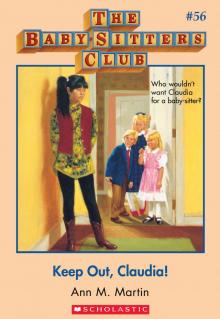 Keep Out, Claudia!
Keep Out, Claudia! Aloha, Baby-Sitters!
Aloha, Baby-Sitters!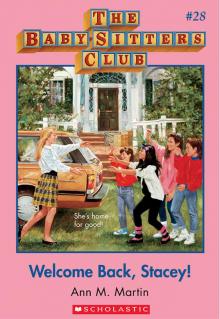 Welcome Back, Stacey
Welcome Back, Stacey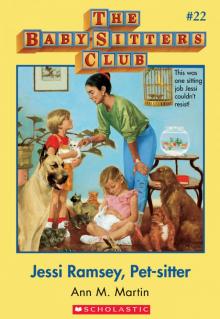 Jessi Ramsey, Pet-Sitter
Jessi Ramsey, Pet-Sitter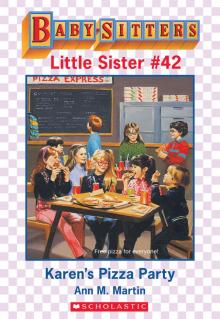 Karen's Pizza Party
Karen's Pizza Party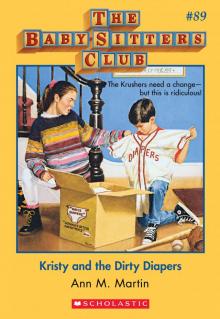 Kristy and the Dirty Diapers
Kristy and the Dirty Diapers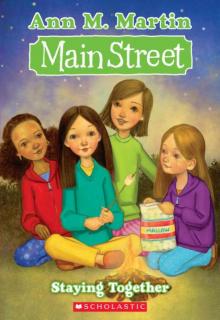 Staying Together
Staying Together Dawn and the Surfer Ghost
Dawn and the Surfer Ghost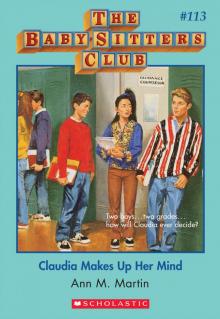 Claudia Makes Up Her Mind
Claudia Makes Up Her Mind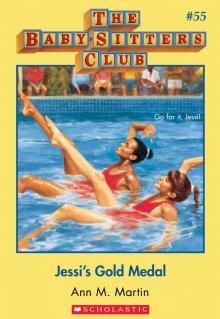 Jessi's Gold Medal
Jessi's Gold Medal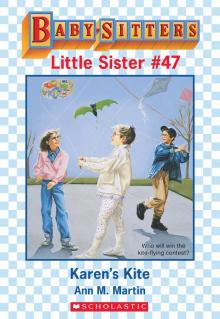 Karen's Kite
Karen's Kite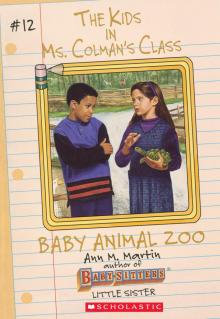 Baby Animal Zoo
Baby Animal Zoo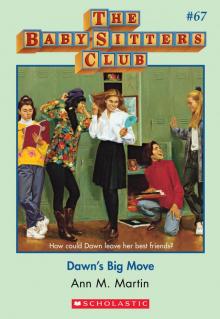 Dawn's Big Move
Dawn's Big Move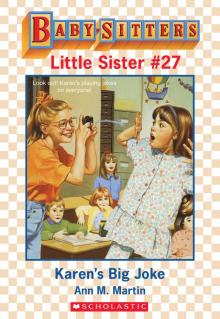 Karen's Big Joke
Karen's Big Joke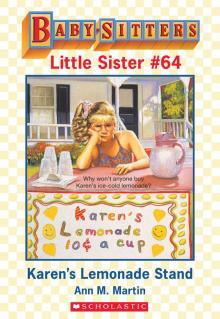 Karen's Lemonade Stand
Karen's Lemonade Stand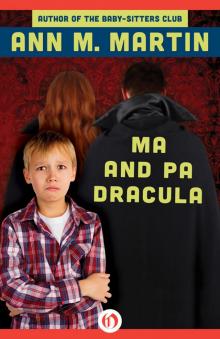 Ma and Pa Dracula
Ma and Pa Dracula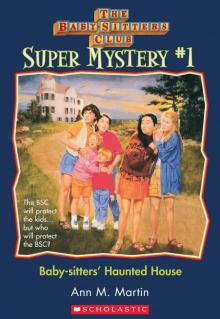 Baby-Sitters' Haunted House
Baby-Sitters' Haunted House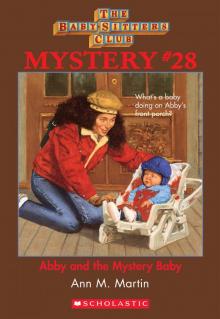 Abby and the Mystery Baby
Abby and the Mystery Baby Home Is the Place
Home Is the Place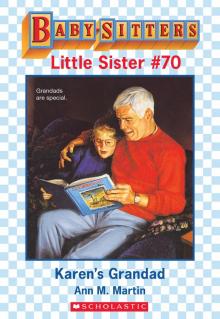 Karen's Grandad
Karen's Grandad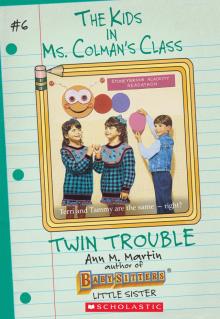 Twin Trouble
Twin Trouble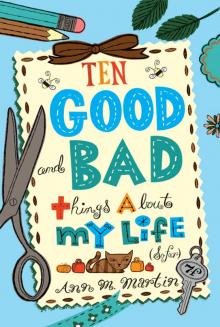 Ten Good and Bad Things About My Life (So Far)
Ten Good and Bad Things About My Life (So Far)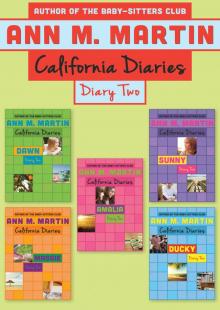 Diary Two
Diary Two Baby-Sitters Club 027
Baby-Sitters Club 027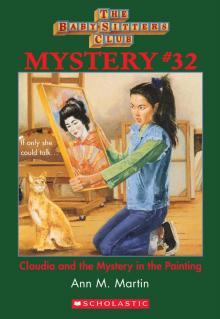 Claudia and the Mystery Painting
Claudia and the Mystery Painting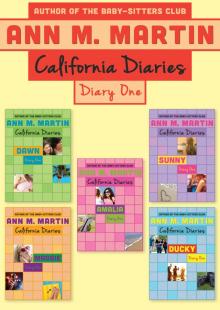 Diary One
Diary One Baby-Sitters Club 037
Baby-Sitters Club 037 Baby-Sitters Club 028
Baby-Sitters Club 028 Baby-Sitters Club 085
Baby-Sitters Club 085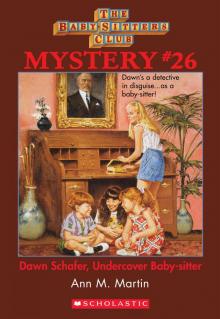 Dawn Schaffer Undercover Baby-Sitter
Dawn Schaffer Undercover Baby-Sitter Jessi's Babysitter
Jessi's Babysitter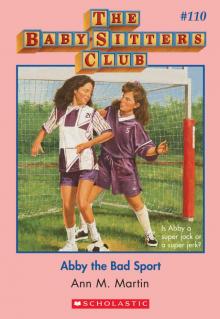 The Baby-Sitters Club #110: Abby the Bad Sport (Baby-Sitters Club, The)
The Baby-Sitters Club #110: Abby the Bad Sport (Baby-Sitters Club, The) Karen's Little Sister
Karen's Little Sister Baby-Sitters Club 058
Baby-Sitters Club 058 Claudia And The Genius On Elm St.
Claudia And The Genius On Elm St.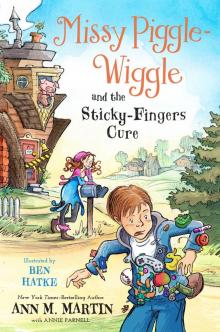 Missy Piggle-Wiggle and the Sticky-Fingers Cure
Missy Piggle-Wiggle and the Sticky-Fingers Cure Kristy and Kidnapper
Kristy and Kidnapper Baby-Sitters Club 041
Baby-Sitters Club 041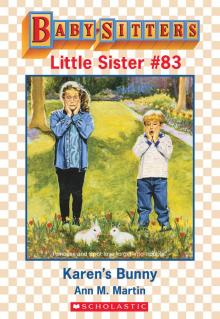 Karen's Bunny Trouble
Karen's Bunny Trouble Baby-Sitters Club 032
Baby-Sitters Club 032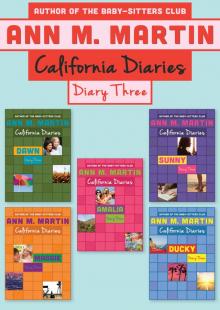 Diary Three
Diary Three Christmas Chiller
Christmas Chiller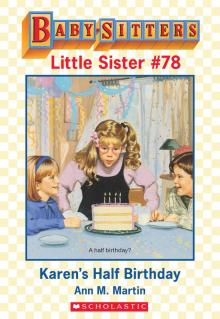 Karen's Half-Birthday
Karen's Half-Birthday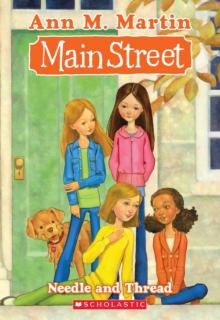 Needle and Thread
Needle and Thread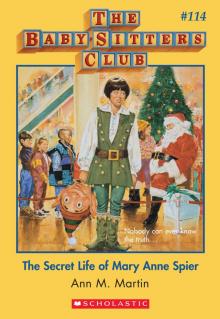 Secret Life of Mary Anne Spier
Secret Life of Mary Anne Spier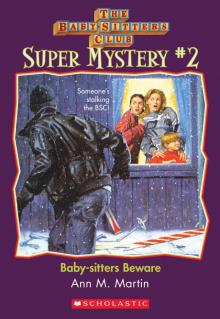 Baby-Sitters Beware
Baby-Sitters Beware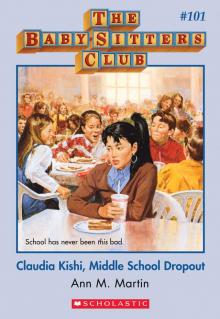 Claudia Kishi, Middle School Drop-Out
Claudia Kishi, Middle School Drop-Out Logan Likes Mary Anne !
Logan Likes Mary Anne ! Baby-Sitters Club 061
Baby-Sitters Club 061 Best Friends
Best Friends Baby-Sitters Club 031
Baby-Sitters Club 031 Karen's Little Witch
Karen's Little Witch Jessi Ramsey, Petsitter
Jessi Ramsey, Petsitter Baby-Sitters Club 123
Baby-Sitters Club 123 Baby-Sitters Club 059
Baby-Sitters Club 059 Baby-Sitters Club 033
Baby-Sitters Club 033 Baby-Sitters Club 060
Baby-Sitters Club 060 Baby-Sitters Club 094
Baby-Sitters Club 094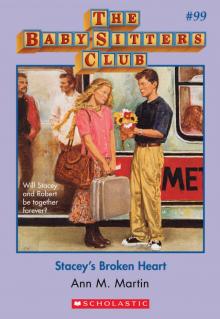 The Baby-Sitters Club #99: Stacey's Broken Heart
The Baby-Sitters Club #99: Stacey's Broken Heart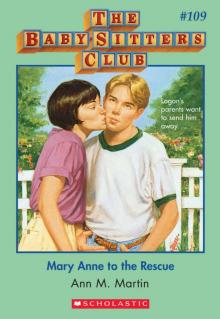 The Baby-Sitters Club #109: Mary Anne to the Rescue (Baby-Sitters Club, The)
The Baby-Sitters Club #109: Mary Anne to the Rescue (Baby-Sitters Club, The) Mystery At Claudia's House
Mystery At Claudia's House Claudia And The Sad Goodbye
Claudia And The Sad Goodbye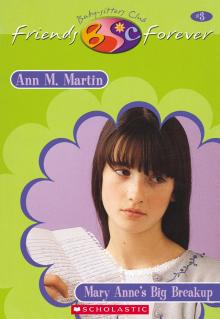 Mary Anne's Big Break-Up
Mary Anne's Big Break-Up Baby-Sitters Club 025
Baby-Sitters Club 025 Baby-Sitters Club 042
Baby-Sitters Club 042 Stacey and the Mystery of the Empty House
Stacey and the Mystery of the Empty House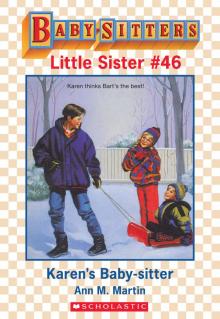 Karen's Baby-Sitter
Karen's Baby-Sitter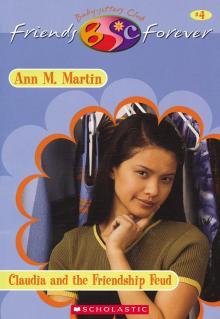 Claudia's Friendship Feud
Claudia's Friendship Feud Baby-Sitters Club 090
Baby-Sitters Club 090 Baby-Sitters Club 021
Baby-Sitters Club 021 Baby-Sitters Club 056
Baby-Sitters Club 056 Baby-Sitters Club 040
Baby-Sitters Club 040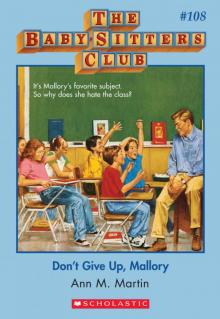 The Baby-Sitters Club #108: Don't Give Up, Mallory (Baby-Sitters Club, The)
The Baby-Sitters Club #108: Don't Give Up, Mallory (Baby-Sitters Club, The)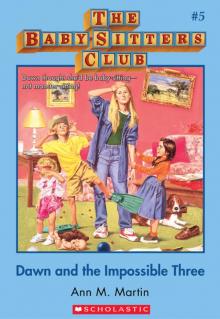 Dawn and the Impossible Three
Dawn and the Impossible Three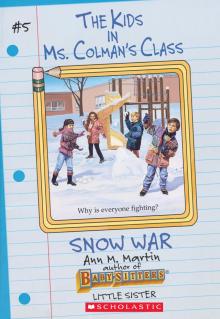 The Snow War
The Snow War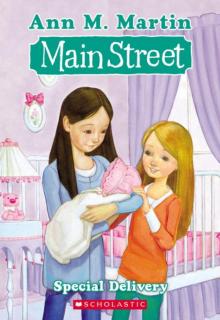 Special Delivery
Special Delivery Baby-Sitters Club 057
Baby-Sitters Club 057 Mary Anne And Too Many Babies
Mary Anne And Too Many Babies Baby-Sitters Club 030
Baby-Sitters Club 030